Totally Free Essay Database
Most popular subjects.
- Film Studies (1697)
- Paintings (505)
- Music (449)
- Management (5492)
- Case Study (4205)
- Company Analysis (2986)
- Cultural Studies (598)
- Cultural Issues (211)
- Ethnicity Studies (167)
- Architecture (407)
- Fashion (195)
- Construction (131)

Diet & Nutrition
- Nutrition (344)
- Food Safety (146)
- World Cuisines & Food Culture (98)
- Economic Systems & Principles (905)
- Finance (641)
- Investment (532)
- Education Theories (732)
- Education Issues (718)
- Teacher Career (408)
Entertainment & Media
- Advertising (422)
- Documentaries (387)
- Media and Society (356)
Environment
- Environmental Studies (587)
- Ecology (576)
- Environmental Management (418)
Family, Life & Experiences
- Personal Experiences (344)
- Parenting (215)
- Marriage (165)
Health & Medicine
- Nursing (2781)
- Healthcare Research (2387)
- Public Health (1811)
- United States (1418)
- World History (1029)
- Criminology (973)
- Criminal Law (859)
- Business & Corporate Law (685)
Linguistics
- Languages (194)
- Language Use (167)
- Language Acquisition (147)
- American Literature (1999)
- World Literature (1448)
- Poems (888)
- Philosophical Theories (476)
- Philosophical Concept (367)
- Philosophers (273)
Politics & Government
- Government (1438)
- International Relations (1078)
- Social & Political Theory (588)
- Psychological Issues (1063)
- Cognition and Perception (563)
- Behavior (552)
- Religion, Culture & Society (771)
- World Religions (374)
- Theology (350)
- Biology (777)
- Scientific Method (723)
- Chemistry (407)
- Sociological Issues (2004)
- Sociological Theories (1098)
- Communications (844)
- Sports Culture (163)
- Sports Science (151)
- Sport Games (110)
Tech & Engineering
- Other Technology (582)
- Project Management (542)
- Technology Effect (505)
- Hospitality Industry (154)
- Trips and Tours (147)
- Tourism Destinations (116)
Transportation
- Air Transport (170)
- Transportation Industry (149)
- Land Transport (128)
- Modern Warfare (282)
- Terrorism (276)
- World War II (182)
Most Popular Essay Topics
Papers by essay type.
- Analytical Essay
- Application Essay
- Argumentative Essay
- Autobiography Essay
- Cause and Effect Essay
- Classification Essay
- Compare & Contrast Essay
- Creative Writing Essay
- Critical Essay
- Deductive Essay
- Definition Essay
- Descriptive Essay
- Evaluation Essay
- Exemplification Essay
- Explicatory Essay
- Exploratory Essay
- Expository Essay
- Inductive Essay
- Informative Essay
- Narrative Essay
- Opinion Essay
- Personal Essay
- Persuasive Essay
- Problem Solution Essay
- Proposal Essay
- Qualitative Research
- Quantitative Research
- Reflective Essay
- Response Essay
- Rhetorical Essay
- Satire Essay
- Self Evaluation Essay
- Synthesis Essay
Essays by Number of Pages
Samples by word count, view recent free essays, nietzschean genealogy: the ineffective form of critique.
- Subjects: Philosophical Concept , Philosophy
- Words: 2199
Fashion Industry: The Role of Marketer
- Subjects: Business , Professions
Ethical Violations in Research
- Subjects: Ethics , Sociology
Ethical Academic Research: Proper Citation of External Sources
The causal theory and the self-concept.
- Subjects: Psychological Influences , Psychology
Technology Implementation: The Role of People and Culture
- Subjects: Tech & Engineering , Technology Effect
The Novel “The Marrow Thieves” by Cherie Dimaline
- Subjects: Literature , World Literature
Patient’s Personal Information Safety
- Subjects: Administration and Regulation , Health & Medicine
Starbucks: The Lack of Willingness to Pay
- Subjects: Business , Product Marketing
Starbucks: The Marketing Research Report
- Subjects: Business , Marketing
Venture Capitalists: Benefits for Entrepreneurs
- Subjects: Business , Entrepreneurship
- Words: 1112
Zika Virus: Protection and Prevention
- Subjects: Health & Medicine , Healthcare Research
Ada Lovelace: Scientific Contributions
- Subjects: Computer Science , Tech & Engineering
Location’s Impact on Smitheford Pharmaceuticals
- Subjects: Business , Financial Management
The Great Resignation: Causes and Effects
- Subjects: Business , Employees Management
- Words: 1423
Starbucks: Market Saturation and Customer Interaction
- Subjects: Business , Case Study
The Junk Foods Advertisement Ban
- Subjects: Advertising Effect , Entertainment & Media
Monster Stories: Impact on Society
- Subjects: Sociological Issues , Sociology
Nissan Motor Company: Operational Resiliency
- Subjects: Business , Risk Management
The Play “All My Sons” by Arthur Miller
- Subjects: Literature , Plays
Frequently asked questions
Free Essay Examples Database by PapersOwl

The ways we can help you
Essay types.
Discover writing strategies that apply to narrative, descriptive, expository, persuasive, compare and contrast, cause and effect papers, and other essay types
Writing help
Hire a writer to get a unique essay crafted to your needs: any topic, any deadline, any instructions. In-time submission and high academic quality guaranteed.
Writing tools
Strengthen your writing with plagiarism checks, pinpoint paraphrasing errors & instant citations.
Study resources
- Essay writing guide
- Essay Structure
- Citation guide
- Essay Formatting
- Plagiarism 101
- Punctuation Guide
- Dissertation writing
- PowerPoint Presentation
- Research process
Essay samples by category
With regard to college paper subjects, there is no shortage of free essay themes available. Professors, instructors, and educators in universities, colleges, and schools appear to be resourceful engines, continuously generating an infinite array of essay topics.
Medicine And Health
- Women's Health
- Public Health
- Organ Donation
- Mental Health
- Impact of Technology
- Biotechnology
- Advantages of Technology
- Internet Privacy
- Gamification
- Cyber Security
- Computer Software
- Volunteering
- Socialization
- Social Work
- Social Status
- Social Responsibility
- Social Norm
- Social Networking
- Social Movements
- Social Issues
- Social Exclusion
- Social science
- Scientific method
- Radiation Therapy
- Political Science
- Pharmacology
- Superstition
- Supernatural
- Reincarnation
- Mother Teresa
- Good and evil
- Wuthering Heights
- Virginia Woolf
- Tennessee Williams
- Sandra Cisneros
- Phillis Wheatley
- Nathaniel Hawthorne
- United States Constitution
- Surveillance
- Prohibition
- Plessy v Ferguson
- Mass Incarceration
- Law Enforcement
- Thomas Jefferson
- Richard Nixon
- Public Speaking
- Political party
- Michelle Obama
- Mahatma Gandhi
- Study Abroad
- Special Education
- Recommendation
- Physical Education
- Higher Education
- Education System
- Female Education
- Swot Analysis
- Organization
- International Business
- Entrepreneurship
- Bussiness Plan
- Visual Arts
- Romanticism
- Renaissance
- Movie Review
- Architecture
- Relationships
- Entertainment
Still Need Help With Essay Writing?

1. Submit Instructions

2. Choose Essay Writer

3. Track Order

4. Check Paper
100% happiness guarantee, free paper examples by words:, last added essay samples, winston churchill: the steadfast leader of great britain during wwii.
Winston Churchill the indomitable Prime Minister of Great Britain during World War II stands as one of history's most significant leaders. His leadership and rhetoric not only inspired the British people but also played a crucial role in shaping the Allied strategy that ultimately led to the defeat of Nazi Germany. Churchill's tenure as Prime Minister during the war years is marked by his resilience strategic acumen and unwavering commitment to victory making him a pivotal figure in the global […]
Zheng He: a Pioneering Figure in World History
Zheng He a Chinese mariner and explorer from the Ming Dynasty was a big deal in history. Born in 1371 in Yunnan he started as Ma He but got captured and castrated young serving as a eunuch in the royal court. Thanks to his smarts and loyalty he rose up and became a key advisor to the Yongle Emperor. His legacy? Seven epic voyages from 1405 to 1433 that put China on the map as a top-notch maritime power sparking […]
Yellow Journalism in U.S. History: a Critical Examination
The phenomenon of yellow journalism in American history unveils a dynamic era where mediatactics evolved showy. Appearing during late 19 - ?? of century yellow journalism what exemplified by a competitive competition between New York by the World Joseph Pulitzer and William Randolph New York Magazine Hearst gave a kind to the new medialandscape from him bold and often artificial sensation by approach. Yellow journalism was prominent his disrobe titles transplanted histories and the strategic use of dramatic vividness to […]
Woolworths Limited: a Retail Giant’s Evolution
Woolworths Group once known as Woolworths Limited is a big name in Aussie retail known for its smarts and keeping shoppers happy. Since kicking off in 1924 with a single basement store in Sydney it's grown into one of Australia's biggest and most varied retail giants. Woolworths' journey over nearly a century shows how it's kept up with what people want changing markets and new tech. Started by Percy Christmas Stanley Chatterton Cecil Scott Waine George Creed and Ernest Williams […]
Woodrow Wilson’s Political Ideology and its Impact
Woodrow Wilson 28 - ? preside actual unis widely confesses so as democrat. His chairmanship moves from 1913 at first 1921 was a remark reforms and above all politics that equalized close with principles democratic party then. Understanding ideology Wilson and his political affecting American politics asks a fence look at his basis politics and context vast democratic party in one flow from 20 - ?? beginning century. Career Wilson politique began in an academy so as erudite and president […]
Woolworths Limited: a Retail Giant’s Evolution and Impact
Woolworths Limited known today as Woolworths Group is an iconic name in the Australian retail industry. Founded in 1924 in Sydney Woolworths has grown from a single store into one of the largest and most influential retail companies in Australia. Its evolution reflects significant shifts in consumer behavior retail strategies and economic landscapes over nearly a century. The first Woolworths store opened in Sydney's Imperial Arcade and it was marketed as the "fresh food people" a slogan that would become […]
Why the Minimum Age Requirement for U.S. Presidents Matters
The U.S. Constitution ratified in 1788 outlines the fundamental framework of American governance including the qualifications required to hold the nation's highest office. Among these qualifications one of the most straightforward is the minimum age requirement: a person must be at least 35 years old to be eligible for the presidency. This seemingly arbitrary number has significant implications reflecting the framers' intentions and continuing to impact the political landscape today. The decision to set the minimum age at 35 was […]
William Wallace: a Scottish Hero’s Legacy
William Wallace celebrates pretended to be "Braveheart in an epic film" stands so as central person in the Scottish search for independence in one flow from a medieval period. Born around 1270 Wallace appeared from basis spoiled English advantage to become a symbol resistance and valor that continues to ring in stories and folk imagination histories. While film "Braveheart" directed Mel Gibson pretends to be Wallace with drama sense of smell she too captive essence his appeal despite English oppresses. […]
Water: the Lifesource of Human Physiology
Water - not only necessity for human life; it are elements that confirms our existence basic. Moves approximately 60f crowd meat the grown man water leaks a closet fabric and every organ serves a vital solvent for reactions pipeline biochemical for a transfer and regulator temperature meat nourishing. In cage the stage water serves a catalyst for essence processes metabolic despite life. These facilitate reactions that herds metabolism and settle uptake enzymic nutritives. Through osmosis and transmission water leans balance […]
William Shakespeare’s “Hamlet”: a Tragic Exploration of Revenge and Moral Conundrums
William Shakespeare's "Hamlet" stands as a timeless exploration of human psyche blending tragedy with introspection. Set in the Danish kingdom the play follows Prince Hamlet's quest for vengeance against his uncle Claudius who has murdered Hamlet's father to usurp the throne and marry Hamlet's mother Queen Gertrude. At its core "Hamlet" delves into themes of revenge morality and the complexity of human nature. Hamlet's famous soliloquies such as "To be or not to be" reflect his profound contemplation on life […]

Our writers will help you fix any mistakes and get an A+!
1. Tell Us Your Requirements
2. Pick your perfect writer
3. Get Your Paper and Pay
short deadlines
100% Plagiarism-Free
Certified writers

Choose Your Test
- Search Blogs By Category
- College Admissions
- AP and IB Exams
- GPA and Coursework
177 College Essay Examples for 11 Schools + Expert Analysis
College Admissions , College Essays

The personal statement might just be the hardest part of your college application. Mostly this is because it has the least guidance and is the most open-ended. One way to understand what colleges are looking for when they ask you to write an essay is to check out the essays of students who already got in—college essays that actually worked. After all, they must be among the most successful of this weird literary genre.
In this article, I'll go through general guidelines for what makes great college essays great. I've also compiled an enormous list of 100+ actual sample college essays from 11 different schools. Finally, I'll break down two of these published college essay examples and explain why and how they work. With links to 177 full essays and essay excerpts , this article is a great resource for learning how to craft your own personal college admissions essay!
What Excellent College Essays Have in Common
Even though in many ways these sample college essays are very different from one other, they do share some traits you should try to emulate as you write your own essay.
Visible Signs of Planning
Building out from a narrow, concrete focus. You'll see a similar structure in many of the essays. The author starts with a very detailed story of an event or description of a person or place. After this sense-heavy imagery, the essay expands out to make a broader point about the author, and connects this very memorable experience to the author's present situation, state of mind, newfound understanding, or maturity level.
Knowing how to tell a story. Some of the experiences in these essays are one-of-a-kind. But most deal with the stuff of everyday life. What sets them apart is the way the author approaches the topic: analyzing it for drama and humor, for its moving qualities, for what it says about the author's world, and for how it connects to the author's emotional life.
Stellar Execution
A killer first sentence. You've heard it before, and you'll hear it again: you have to suck the reader in, and the best place to do that is the first sentence. Great first sentences are punchy. They are like cliffhangers, setting up an exciting scene or an unusual situation with an unclear conclusion, in order to make the reader want to know more. Don't take my word for it—check out these 22 first sentences from Stanford applicants and tell me you don't want to read the rest of those essays to find out what happens!
A lively, individual voice. Writing is for readers. In this case, your reader is an admissions officer who has read thousands of essays before yours and will read thousands after. Your goal? Don't bore your reader. Use interesting descriptions, stay away from clichés, include your own offbeat observations—anything that makes this essay sounds like you and not like anyone else.

Technical correctness. No spelling mistakes, no grammar weirdness, no syntax issues, no punctuation snafus—each of these sample college essays has been formatted and proofread perfectly. If this kind of exactness is not your strong suit, you're in luck! All colleges advise applicants to have their essays looked over several times by parents, teachers, mentors, and anyone else who can spot a comma splice. Your essay must be your own work, but there is absolutely nothing wrong with getting help polishing it.
And if you need more guidance, connect with PrepScholar's expert admissions consultants . These expert writers know exactly what college admissions committees look for in an admissions essay and chan help you craft an essay that boosts your chances of getting into your dream school.
Check out PrepScholar's Essay Editing and Coaching progra m for more details!

Links to Full College Essay Examples
Some colleges publish a selection of their favorite accepted college essays that worked, and I've put together a selection of over 100 of these.
Common App Essay Samples
Please note that some of these college essay examples may be responding to prompts that are no longer in use. The current Common App prompts are as follows:
1. Some students have a background, identity, interest, or talent that is so meaningful they believe their application would be incomplete without it. If this sounds like you, then please share your story. 2. The lessons we take from obstacles we encounter can be fundamental to later success. Recount a time when you faced a challenge, setback, or failure. How did it affect you, and what did you learn from the experience? 3. Reflect on a time when you questioned or challenged a belief or idea. What prompted your thinking? What was the outcome? 4. Reflect on something that someone has done for you that has made you happy or thankful in a surprising way. How has this gratitude affected or motivated you? 5. Discuss an accomplishment, event, or realization that sparked a period of personal growth and a new understanding of yourself or others. 6. Describe a topic, idea, or concept you find so engaging that it makes you lose all track of time. Why does it captivate you? What or who do you turn to when you want to learn more?
7. Share an essay on any topic of your choice. It can be one you've already written, one that responds to a different prompt, or one of your own design.
Now, let's get to the good stuff: the list of 177 college essay examples responding to current and past Common App essay prompts.
Connecticut college.
- 12 Common Application essays from the classes of 2022-2025
Hamilton College
- 7 Common Application essays from the class of 2026
- 7 Common Application essays from the class of 2022
- 7 Common Application essays from the class of 2018
- 8 Common Application essays from the class of 2012
- 8 Common Application essays from the class of 2007
Johns Hopkins
These essays are answers to past prompts from either the Common Application or the Coalition Application (which Johns Hopkins used to accept).
- 1 Common Application or Coalition Application essay from the class of 2026
- 6 Common Application or Coalition Application essays from the class of 2025
- 6 Common Application or Universal Application essays from the class of 2024
- 6 Common Application or Universal Application essays from the class of 2023
- 7 Common Application of Universal Application essays from the class of 2022
- 5 Common Application or Universal Application essays from the class of 2021
- 7 Common Application or Universal Application essays from the class of 2020
Essay Examples Published by Other Websites
- 2 Common Application essays ( 1st essay , 2nd essay ) from applicants admitted to Columbia
Other Sample College Essays
Here is a collection of essays that are college-specific.
Babson College
- 4 essays (and 1 video response) on "Why Babson" from the class of 2020
Emory University
- 5 essay examples ( 1 , 2 , 3 , 4 , 5 ) from the class of 2020 along with analysis from Emory admissions staff on why the essays were exceptional
- 5 more recent essay examples ( 1 , 2 , 3 , 4 , 5 ) along with analysis from Emory admissions staff on what made these essays stand out
University of Georgia
- 1 “strong essay” sample from 2019
- 1 “strong essay” sample from 2018
- 10 Harvard essays from 2023
- 10 Harvard essays from 2022
- 10 Harvard essays from 2021
- 10 Harvard essays from 2020
- 10 Harvard essays from 2019
- 10 Harvard essays from 2018
- 6 essays from admitted MIT students
Smith College
- 6 "best gift" essays from the class of 2018

Books of College Essays
If you're looking for even more sample college essays, consider purchasing a college essay book. The best of these include dozens of essays that worked and feedback from real admissions officers.
College Essays That Made a Difference —This detailed guide from Princeton Review includes not only successful essays, but also interviews with admissions officers and full student profiles.
50 Successful Harvard Application Essays by the Staff of the Harvard Crimson—A must for anyone aspiring to Harvard .
50 Successful Ivy League Application Essays and 50 Successful Stanford Application Essays by Gen and Kelly Tanabe—For essays from other top schools, check out this venerated series, which is regularly updated with new essays.
Heavenly Essays by Janine W. Robinson—This collection from the popular blogger behind Essay Hell includes a wider range of schools, as well as helpful tips on honing your own essay.

Analyzing Great Common App Essays That Worked
I've picked two essays from the examples collected above to examine in more depth so that you can see exactly what makes a successful college essay work. Full credit for these essays goes to the original authors and the schools that published them.
Example 1: "Breaking Into Cars," by Stephen, Johns Hopkins Class of '19 (Common App Essay, 636 words long)
I had never broken into a car before.
We were in Laredo, having just finished our first day at a Habitat for Humanity work site. The Hotchkiss volunteers had already left, off to enjoy some Texas BBQ, leaving me behind with the college kids to clean up. Not until we were stranded did we realize we were locked out of the van.
Someone picked a coat hanger out of the dumpster, handed it to me, and took a few steps back.
"Can you do that thing with a coat hanger to unlock it?"
"Why me?" I thought.
More out of amusement than optimism, I gave it a try. I slid the hanger into the window's seal like I'd seen on crime shows, and spent a few minutes jiggling the apparatus around the inside of the frame. Suddenly, two things simultaneously clicked. One was the lock on the door. (I actually succeeded in springing it.) The other was the realization that I'd been in this type of situation before. In fact, I'd been born into this type of situation.
My upbringing has numbed me to unpredictability and chaos. With a family of seven, my home was loud, messy, and spottily supervised. My siblings arguing, the dog barking, the phone ringing—all meant my house was functioning normally. My Dad, a retired Navy pilot, was away half the time. When he was home, he had a parenting style something like a drill sergeant. At the age of nine, I learned how to clear burning oil from the surface of water. My Dad considered this a critical life skill—you know, in case my aircraft carrier should ever get torpedoed. "The water's on fire! Clear a hole!" he shouted, tossing me in the lake without warning. While I'm still unconvinced about that particular lesson's practicality, my Dad's overarching message is unequivocally true: much of life is unexpected, and you have to deal with the twists and turns.
Living in my family, days rarely unfolded as planned. A bit overlooked, a little pushed around, I learned to roll with reality, negotiate a quick deal, and give the improbable a try. I don't sweat the small stuff, and I definitely don't expect perfect fairness. So what if our dining room table only has six chairs for seven people? Someone learns the importance of punctuality every night.
But more than punctuality and a special affinity for musical chairs, my family life has taught me to thrive in situations over which I have no power. Growing up, I never controlled my older siblings, but I learned how to thwart their attempts to control me. I forged alliances, and realigned them as necessary. Sometimes, I was the poor, defenseless little brother; sometimes I was the omniscient elder. Different things to different people, as the situation demanded. I learned to adapt.
Back then, these techniques were merely reactions undertaken to ensure my survival. But one day this fall, Dr. Hicks, our Head of School, asked me a question that he hoped all seniors would reflect on throughout the year: "How can I participate in a thing I do not govern, in the company of people I did not choose?"
The question caught me off guard, much like the question posed to me in Laredo. Then, I realized I knew the answer. I knew why the coat hanger had been handed to me.
Growing up as the middle child in my family, I was a vital participant in a thing I did not govern, in the company of people I did not choose. It's family. It's society. And often, it's chaos. You participate by letting go of the small stuff, not expecting order and perfection, and facing the unexpected with confidence, optimism, and preparedness. My family experience taught me to face a serendipitous world with confidence.
What Makes This Essay Tick?
It's very helpful to take writing apart in order to see just how it accomplishes its objectives. Stephen's essay is very effective. Let's find out why!
An Opening Line That Draws You In
In just eight words, we get: scene-setting (he is standing next to a car about to break in), the idea of crossing a boundary (he is maybe about to do an illegal thing for the first time), and a cliffhanger (we are thinking: is he going to get caught? Is he headed for a life of crime? Is he about to be scared straight?).
Great, Detailed Opening Story
More out of amusement than optimism, I gave it a try. I slid the hanger into the window's seal like I'd seen on crime shows, and spent a few minutes jiggling the apparatus around the inside of the frame.
It's the details that really make this small experience come alive. Notice how whenever he can, Stephen uses a more specific, descriptive word in place of a more generic one. The volunteers aren't going to get food or dinner; they're going for "Texas BBQ." The coat hanger comes from "a dumpster." Stephen doesn't just move the coat hanger—he "jiggles" it.
Details also help us visualize the emotions of the people in the scene. The person who hands Stephen the coat hanger isn't just uncomfortable or nervous; he "takes a few steps back"—a description of movement that conveys feelings. Finally, the detail of actual speech makes the scene pop. Instead of writing that the other guy asked him to unlock the van, Stephen has the guy actually say his own words in a way that sounds like a teenager talking.

Turning a Specific Incident Into a Deeper Insight
Suddenly, two things simultaneously clicked. One was the lock on the door. (I actually succeeded in springing it.) The other was the realization that I'd been in this type of situation before. In fact, I'd been born into this type of situation.
Stephen makes the locked car experience a meaningful illustration of how he has learned to be resourceful and ready for anything, and he also makes this turn from the specific to the broad through an elegant play on the two meanings of the word "click."
Using Concrete Examples When Making Abstract Claims
My upbringing has numbed me to unpredictability and chaos. With a family of seven, my home was loud, messy, and spottily supervised. My siblings arguing, the dog barking, the phone ringing—all meant my house was functioning normally.
"Unpredictability and chaos" are very abstract, not easily visualized concepts. They could also mean any number of things—violence, abandonment, poverty, mental instability. By instantly following up with highly finite and unambiguous illustrations like "family of seven" and "siblings arguing, the dog barking, the phone ringing," Stephen grounds the abstraction in something that is easy to picture: a large, noisy family.
Using Small Bits of Humor and Casual Word Choice
My Dad, a retired Navy pilot, was away half the time. When he was home, he had a parenting style something like a drill sergeant. At the age of nine, I learned how to clear burning oil from the surface of water. My Dad considered this a critical life skill—you know, in case my aircraft carrier should ever get torpedoed.
Obviously, knowing how to clean burning oil is not high on the list of things every 9-year-old needs to know. To emphasize this, Stephen uses sarcasm by bringing up a situation that is clearly over-the-top: "in case my aircraft carrier should ever get torpedoed."
The humor also feels relaxed. Part of this is because he introduces it with the colloquial phrase "you know," so it sounds like he is talking to us in person. This approach also diffuses the potential discomfort of the reader with his father's strictness—since he is making jokes about it, clearly he is OK. Notice, though, that this doesn't occur very much in the essay. This helps keep the tone meaningful and serious rather than flippant.

An Ending That Stretches the Insight Into the Future
But one day this fall, Dr. Hicks, our Head of School, asked me a question that he hoped all seniors would reflect on throughout the year: "How can I participate in a thing I do not govern, in the company of people I did not choose?"
The ending of the essay reveals that Stephen's life has been one long preparation for the future. He has emerged from chaos and his dad's approach to parenting as a person who can thrive in a world that he can't control.
This connection of past experience to current maturity and self-knowledge is a key element in all successful personal essays. Colleges are very much looking for mature, self-aware applicants. These are the qualities of successful college students, who will be able to navigate the independence college classes require and the responsibility and quasi-adulthood of college life.
What Could This Essay Do Even Better?
Even the best essays aren't perfect, and even the world's greatest writers will tell you that writing is never "finished"—just "due." So what would we tweak in this essay if we could?
Replace some of the clichéd language. Stephen uses handy phrases like "twists and turns" and "don't sweat the small stuff" as a kind of shorthand for explaining his relationship to chaos and unpredictability. But using too many of these ready-made expressions runs the risk of clouding out your own voice and replacing it with something expected and boring.
Use another example from recent life. Stephen's first example (breaking into the van in Laredo) is a great illustration of being resourceful in an unexpected situation. But his essay also emphasizes that he "learned to adapt" by being "different things to different people." It would be great to see how this plays out outside his family, either in the situation in Laredo or another context.

Example 2: By Renner Kwittken, Tufts Class of '23 (Common App Essay, 645 words long)
My first dream job was to be a pickle truck driver. I saw it in my favorite book, Richard Scarry's "Cars and Trucks and Things That Go," and for some reason, I was absolutely obsessed with the idea of driving a giant pickle. Much to the discontent of my younger sister, I insisted that my parents read us that book as many nights as possible so we could find goldbug, a small little golden bug, on every page. I would imagine the wonderful life I would have: being a pig driving a giant pickle truck across the country, chasing and finding goldbug. I then moved on to wanting to be a Lego Master. Then an architect. Then a surgeon.
Then I discovered a real goldbug: gold nanoparticles that can reprogram macrophages to assist in killing tumors, produce clear images of them without sacrificing the subject, and heat them to obliteration.
Suddenly the destination of my pickle was clear.
I quickly became enveloped by the world of nanomedicine; I scoured articles about liposomes, polymeric micelles, dendrimers, targeting ligands, and self-assembling nanoparticles, all conquering cancer in some exotic way. Completely absorbed, I set out to find a mentor to dive even deeper into these topics. After several rejections, I was immensely grateful to receive an invitation to work alongside Dr. Sangeeta Ray at Johns Hopkins.
In the lab, Dr. Ray encouraged a great amount of autonomy to design and implement my own procedures. I chose to attack a problem that affects the entire field of nanomedicine: nanoparticles consistently fail to translate from animal studies into clinical trials. Jumping off recent literature, I set out to see if a pre-dose of a common chemotherapeutic could enhance nanoparticle delivery in aggressive prostate cancer, creating three novel constructs based on three different linear polymers, each using fluorescent dye (although no gold, sorry goldbug!). Though using radioactive isotopes like Gallium and Yttrium would have been incredible, as a 17-year-old, I unfortunately wasn't allowed in the same room as these radioactive materials (even though I took a Geiger counter to a pair of shoes and found them to be slightly dangerous).
I hadn't expected my hypothesis to work, as the research project would have ideally been led across two full years. Yet while there are still many optimizations and revisions to be done, I was thrilled to find -- with completely new nanoparticles that may one day mean future trials will use particles with the initials "RK-1" -- thatcyclophosphamide did indeed increase nanoparticle delivery to the tumor in a statistically significant way.
A secondary, unexpected research project was living alone in Baltimore, a new city to me, surrounded by people much older than I. Even with moving frequently between hotels, AirBnB's, and students' apartments, I strangely reveled in the freedom I had to enjoy my surroundings and form new friendships with graduate school students from the lab. We explored The Inner Harbor at night, attended a concert together one weekend, and even got to watch the Orioles lose (to nobody's surprise). Ironically, it's through these new friendships I discovered something unexpected: what I truly love is sharing research. Whether in a presentation or in a casual conversation, making others interested in science is perhaps more exciting to me than the research itself. This solidified a new pursuit to angle my love for writing towards illuminating science in ways people can understand, adding value to a society that can certainly benefit from more scientific literacy.
It seems fitting that my goals are still transforming: in Scarry's book, there is not just one goldbug, there is one on every page. With each new experience, I'm learning that it isn't the goldbug itself, but rather the act of searching for the goldbugs that will encourage, shape, and refine my ever-evolving passions. Regardless of the goldbug I seek -- I know my pickle truck has just begun its journey.
Renner takes a somewhat different approach than Stephen, but their essay is just as detailed and engaging. Let's go through some of the strengths of this essay.
One Clear Governing Metaphor
This essay is ultimately about two things: Renner’s dreams and future career goals, and Renner’s philosophy on goal-setting and achieving one’s dreams.
But instead of listing off all the amazing things they’ve done to pursue their dream of working in nanomedicine, Renner tells a powerful, unique story instead. To set up the narrative, Renner opens the essay by connecting their experiences with goal-setting and dream-chasing all the way back to a memorable childhood experience:
This lighthearted–but relevant!--story about the moment when Renner first developed a passion for a specific career (“finding the goldbug”) provides an anchor point for the rest of the essay. As Renner pivots to describing their current dreams and goals–working in nanomedicine–the metaphor of “finding the goldbug” is reflected in Renner’s experiments, rejections, and new discoveries.
Though Renner tells multiple stories about their quest to “find the goldbug,” or, in other words, pursue their passion, each story is connected by a unifying theme; namely, that as we search and grow over time, our goals will transform…and that’s okay! By the end of the essay, Renner uses the metaphor of “finding the goldbug” to reiterate the relevance of the opening story:
While the earlier parts of the essay convey Renner’s core message by showing, the final, concluding paragraph sums up Renner’s insights by telling. By briefly and clearly stating the relevance of the goldbug metaphor to their own philosophy on goals and dreams, Renner demonstrates their creativity, insight, and eagerness to grow and evolve as the journey continues into college.

An Engaging, Individual Voice
This essay uses many techniques that make Renner sound genuine and make the reader feel like we already know them.
Technique #1: humor. Notice Renner's gentle and relaxed humor that lightly mocks their younger self's grand ambitions (this is different from the more sarcastic kind of humor used by Stephen in the first essay—you could never mistake one writer for the other).
My first dream job was to be a pickle truck driver.
I would imagine the wonderful life I would have: being a pig driving a giant pickle truck across the country, chasing and finding goldbug. I then moved on to wanting to be a Lego Master. Then an architect. Then a surgeon.
Renner gives a great example of how to use humor to your advantage in college essays. You don’t want to come off as too self-deprecating or sarcastic, but telling a lightheartedly humorous story about your younger self that also showcases how you’ve grown and changed over time can set the right tone for your entire essay.
Technique #2: intentional, eye-catching structure. The second technique is the way Renner uses a unique structure to bolster the tone and themes of their essay . The structure of your essay can have a major impact on how your ideas come across…so it’s important to give it just as much thought as the content of your essay!
For instance, Renner does a great job of using one-line paragraphs to create dramatic emphasis and to make clear transitions from one phase of the story to the next:
Suddenly the destination of my pickle car was clear.
Not only does the one-liner above signal that Renner is moving into a new phase of the narrative (their nanoparticle research experiences), it also tells the reader that this is a big moment in Renner’s story. It’s clear that Renner made a major discovery that changed the course of their goal pursuit and dream-chasing. Through structure, Renner conveys excitement and entices the reader to keep pushing forward to the next part of the story.
Technique #3: playing with syntax. The third technique is to use sentences of varying length, syntax, and structure. Most of the essay's written in standard English and uses grammatically correct sentences. However, at key moments, Renner emphasizes that the reader needs to sit up and pay attention by switching to short, colloquial, differently punctuated, and sometimes fragmented sentences.
Even with moving frequently between hotels, AirBnB's, and students' apartments, I strangely reveled in the freedom I had to enjoy my surroundings and form new friendships with graduate school students from the lab. We explored The Inner Harbor at night, attended a concert together one weekend, and even got to watch the Orioles lose (to nobody's surprise). Ironically, it's through these new friendships I discovered something unexpected: what I truly love is sharing research.
In the examples above, Renner switches adeptly between long, flowing sentences and quippy, telegraphic ones. At the same time, Renner uses these different sentence lengths intentionally. As they describe their experiences in new places, they use longer sentences to immerse the reader in the sights, smells, and sounds of those experiences. And when it’s time to get a big, key idea across, Renner switches to a short, punchy sentence to stop the reader in their tracks.
The varying syntax and sentence lengths pull the reader into the narrative and set up crucial “aha” moments when it’s most important…which is a surefire way to make any college essay stand out.

Renner's essay is very strong, but there are still a few little things that could be improved.
Connecting the research experiences to the theme of “finding the goldbug.” The essay begins and ends with Renner’s connection to the idea of “finding the goldbug.” And while this metaphor is deftly tied into the essay’s intro and conclusion, it isn’t entirely clear what Renner’s big findings were during the research experiences that are described in the middle of the essay. It would be great to add a sentence or two stating what Renner’s big takeaways (or “goldbugs”) were from these experiences, which add more cohesion to the essay as a whole.
Give more details about discovering the world of nanomedicine. It makes sense that Renner wants to get into the details of their big research experiences as quickly as possible. After all, these are the details that show Renner’s dedication to nanomedicine! But a smoother transition from the opening pickle car/goldbug story to Renner’s “real goldbug” of nanoparticles would help the reader understand why nanoparticles became Renner’s goldbug. Finding out why Renner is so motivated to study nanomedicine–and perhaps what put them on to this field of study–would help readers fully understand why Renner chose this path in the first place.
4 Essential Tips for Writing Your Own Essay
How can you use this discussion to better your own college essay? Here are some suggestions for ways to use this resource effectively.
#1: Get Help From the Experts
Getting your college applications together takes a lot of work and can be pretty intimidatin g. Essays are even more important than ever now that admissions processes are changing and schools are going test-optional and removing diversity standards thanks to new Supreme Court rulings . If you want certified expert help that really makes a difference, get started with PrepScholar’s Essay Editing and Coaching program. Our program can help you put together an incredible essay from idea to completion so that your application stands out from the crowd. We've helped students get into the best colleges in the United States, including Harvard, Stanford, and Yale. If you're ready to take the next step and boost your odds of getting into your dream school, connect with our experts today .
#2: Read Other Essays to Get Ideas for Your Own
As you go through the essays we've compiled for you above, ask yourself the following questions:
- Can you explain to yourself (or someone else!) why the opening sentence works well?
- Look for the essay's detailed personal anecdote. What senses is the author describing? Can you easily picture the scene in your mind's eye?
- Find the place where this anecdote bridges into a larger insight about the author. How does the essay connect the two? How does the anecdote work as an example of the author's characteristic, trait, or skill?
- Check out the essay's tone. If it's funny, can you find the places where the humor comes from? If it's sad and moving, can you find the imagery and description of feelings that make you moved? If it's serious, can you see how word choice adds to this tone?
Make a note whenever you find an essay or part of an essay that you think was particularly well-written, and think about what you like about it . Is it funny? Does it help you really get to know the writer? Does it show what makes the writer unique? Once you have your list, keep it next to you while writing your essay to remind yourself to try and use those same techniques in your own essay.

#3: Find Your "A-Ha!" Moment
All of these essays rely on connecting with the reader through a heartfelt, highly descriptive scene from the author's life. It can either be very dramatic (did you survive a plane crash?) or it can be completely mundane (did you finally beat your dad at Scrabble?). Either way, it should be personal and revealing about you, your personality, and the way you are now that you are entering the adult world.
Check out essays by authors like John Jeremiah Sullivan , Leslie Jamison , Hanif Abdurraqib , and Esmé Weijun Wang to get more examples of how to craft a compelling personal narrative.
#4: Start Early, Revise Often
Let me level with you: the best writing isn't writing at all. It's rewriting. And in order to have time to rewrite, you have to start way before the application deadline. My advice is to write your first draft at least two months before your applications are due.
Let it sit for a few days untouched. Then come back to it with fresh eyes and think critically about what you've written. What's extra? What's missing? What is in the wrong place? What doesn't make sense? Don't be afraid to take it apart and rearrange sections. Do this several times over, and your essay will be much better for it!
For more editing tips, check out a style guide like Dreyer's English or Eats, Shoots & Leaves .

What's Next?
Still not sure which colleges you want to apply to? Our experts will show you how to make a college list that will help you choose a college that's right for you.
Interested in learning more about college essays? Check out our detailed breakdown of exactly how personal statements work in an application , some suggestions on what to avoid when writing your essay , and our guide to writing about your extracurricular activities .
Working on the rest of your application? Read what admissions officers wish applicants knew before applying .

The recommendations in this post are based solely on our knowledge and experience. If you purchase an item through one of our links PrepScholar may receive a commission.
Trending Now
How to Get Into Harvard and the Ivy League
How to Get a Perfect 4.0 GPA
How to Write an Amazing College Essay
What Exactly Are Colleges Looking For?
ACT vs. SAT: Which Test Should You Take?
When should you take the SAT or ACT?
Get Your Free

Find Your Target SAT Score
Free Complete Official SAT Practice Tests
How to Get a Perfect SAT Score, by an Expert Full Scorer
Score 800 on SAT Math
Score 800 on SAT Reading and Writing
How to Improve Your Low SAT Score
Score 600 on SAT Math
Score 600 on SAT Reading and Writing
Find Your Target ACT Score
Complete Official Free ACT Practice Tests
How to Get a Perfect ACT Score, by a 36 Full Scorer
Get a 36 on ACT English
Get a 36 on ACT Math
Get a 36 on ACT Reading
Get a 36 on ACT Science
How to Improve Your Low ACT Score
Get a 24 on ACT English
Get a 24 on ACT Math
Get a 24 on ACT Reading
Get a 24 on ACT Science
Stay Informed
Get the latest articles and test prep tips!

Anna scored in the 99th percentile on her SATs in high school, and went on to major in English at Princeton and to get her doctorate in English Literature at Columbia. She is passionate about improving student access to higher education.
Ask a Question Below
Have any questions about this article or other topics? Ask below and we'll reply!
24/7 writing help on your phone
To install StudyMoose App tap and then “Add to Home Screen”

free essay samples are helpful when you need
Check out some of our verified experts.
- Undergo a strict selection process
- Complete an extensive training class
- Specialize in a number of subjects

Popular essay topics
Recent reviews, last added papers, studymoose is a free essay examples database platform for everyone.
Tired of struggling with writing tasks? StudyMoose is the ultimate solution for all learners’ academic writing needs! Our platform offers an extensive database to help students improve their composition talents. They also get inspired to create. And it’s completely free! Yes, that’s right – no need to pay any penny to access and download StudyMoose’s vast collection.
What Students Can Use Our Free Essays Database For?
StudyMoose understands the challenges that students face with composing papers. Whether one lacks skill or motivation, we’ve got everything covered. StudyMoose has created a platform that provides resources to assist people in boosting their writing. The database with free essays may be used for various purposes, including:
For Inspiration for Writing
Stuck on a particular topic? Use the database of great essays examples for inspiration and ideas to start writing. StudyMoose’s papers cover various topics and are written by experts in their respective fields.
Find Essay Topic Ideas
If you’re struggling to come up with any topic for the essay, StudyMoose is the perfect place to get going. Our database contains a vast topics collection that everyone may choose from. One good idea would be to build an original topic based on several concepts from the list.
Get More In-depth Analysis on Topics of Any Complexity
StudyMoose’s database with free essays examples includes papers on topics of any complexity. Whether one’s looking for an article on a simple topic or breaking down a complex issue, there’s plenty of information on StudyMoose’s website.
Find Writing Guides
Also StudyMoose presents a range of writing guides with 100% free essays that will aid you in directing your skills’ improvement. The most popular option among students offers literature guides to prepare for tasks in English or literature classes. Whether you’re a beginner or an experienced writer, use StudyMoose’s guides to take creativity to the next level and get that A-grade on the essay.
Use Essays for Your Research
If there is a need to gather information on any topic, StudyMoose’s database with essay examples for students might be a valuable resource. The samples may be used as references for one’s research or as a starting point for one’s own composition.
Free High-Quality Essays – Our Key Benefit
The team of expert authors and plagiarism-checking crew work tirelessly to ensure that our essays are of the highest quality. We receive positive feedback from students every day, and we’re striving for improvement of our services.
College Admission Essay Examples: Free Access
We also provide guides for creating these types of essays to make sure students are not lost in the myriad of requirements. Here’s a list of universities for which users may find how-to articles or examples of admission papers:
- University of North Carolina
- University of Rochester
- University of Richmond
Find Essays on Any Types
At StudyMoose, we understand that students may need assistance with different types of papers. That’s why there is a vast collection covering different topics and types on the site. The platform features not only types like an argumentative essays . Users also get persuasive, descriptive, cause-and-effect papers, and much more.
Papers offered on the platform are written by experienced authors who have completed many milestones in education. Their experience in various fields makes them irreplaceable in essay writing.
Use Our Tools to Improve Your Study
All visitors may find writing tips in StudyMoose blog to get a head start on improvement. The vast academic essays database is complemented by a range of tools to help students boost their writing abilities. Each tool is designed to assist learners with various aspects of completing their written assignments. It includes generating concepts, proofreading, and editing their work.
Thesis Statement Generator
Our thesis statement generator is a powerful tool. It shows college research essay examples and enables students to create any thesis statement for their papers easily. This instrument guides learners in a systematic manner and produces a thesis statement tailored to their needs.
Alphabetizer
Alphabetizer is a simple but effective instrument that helps students sort their text. The tool may be used for sorting words, phrases, or even entire paragraphs, making it a useful instrument for organizing essays and research papers.
Conclusion Generator
Conclusion generator creates a compelling conclusion for student essays quickly and easily. After a simple procedure, students get a conclusion based on their input. It is a good idea to also check free examples on the website to get a picture of what a good conclusion looks like.
Essay Rewriter
The essay rewriter tool uses advanced algorithms for producing similar content. It maintains its original meaning and structure. With it, students get a quality paper based on trusted original work with no effort.
Free Plagiarism Checker
The free essays no plagiarism database allows a checker tool to ensure that any student’s paper is original and free from plagiarism. With this tool, one can inspect any essay against billions of web pages and academic papers to make sure that the produced work is original.
Paraphrasing Tool
The paraphrasing tool enables one to rephrase sentences and paragraphs and avoid plagiarism. This tool uses advanced algorithms to reword the text while maintaining its original meaning. Check out how it works with our one page essay examples.
Read My Essay
The “ Read my essay ” tool is a feature that allows users to check one’s essay’s readability and grammar. With this function, one may rest assured that the paper is easy to read and free from grammatical errors.
Get Help With Custom Essay Writing From Our Experts
At StudyMoose, we understand that sometimes reading good essays examples is not enough. Students may need extra help with their tasks. That’s why our website offers custom essay writing services from a team of experienced authors. StudyMoose’s staff are experts in their fields.
In case you require assistance with any research paper, report, or coursework, our free essays to read and a team of writers will assist you. Our website also offers editing and proofreading services to ensure that any submitted assignments are free from errors.
Final Thoughts
StudyMoose believes that learning should be accessible to everyone. That’s why we’ve created a database of completely free essays online that learners may use to improve their ‘penmanship’ skills. With it, they may find inspiration for writing. StudyMoose reviews show that the presented instruments make the process of studying easier.
Our platform should be a valuable resource for you! We encourage everyone to explore the database of all kinds of papers, including short essays examples, and use the instruments we offer. Contact our team of experts if you need additional help. They are always there for you!
How to Write an Essay: Step by Step Guide With Examples

An essay is a brief piece of writing that explains, analyzes, and interprets a topic; it’s also a summary of a particular subject in which the author expresses an opinion.
Does the essay need a title? How many paragraphs does an essay have? Does it have headings and a conclusion? Does the essay have a full stop? Are the introduction, body and conclusion on separate pages? How do you make the cover of an essay?
Here, we will address these frequent questions that come up when you need to write an essay.
What is an essay
The difference between an essay and informational text, like what you might find in an encyclopedia, is that an essay is freer, and its parts are not separated by headings.
The format of an essay and most common doubts
The essay does have each of these parts but they are not identified as in a monographic work, but rather they are written one after another. An example of an essay can be seen at the end of this article.
| Justified text, Justified text, Justified text, Justified text, Justified text, Justified text, Justified text, Justified text, Justified text. | Not Justified, Not Justified, Not Justified, Not Justified, Not Justified, Not Justified, Not Justified, Not Justified, Not Justified, Not Justified, Not Justified, Not Justified, Not Justified, Not Justified, |
The parts or structure of an essay
Introduction , body of the essay, form and organization the body, conclusion .
Here goes the author’s personal opinion, (You, the person doing the essay, your opinion) an essay has, of course, personal opinions in its body, however, in the conclusion these must be emphatic.
How to write a reference in APA format
Author(s) Last Name, First Initial. Middle Initial. (Year of Publication). Title of Book. Publisher. (Optional: Edition)
Author(s) Last Name, First Initial. Middle Initial. (Year of Publication, Month Day). Title of Webpage. Retrieved from Website URL
Example of an essay
University (Name of the university, or college, school, as the case may be) Administration and Accounting Area (The subject can go here) The administrative process A process can be defined as a set of successive steps, phases or actions of a natural or artificial phenomenon. In the context of the study and practice of management, there are different approaches that have contributed to this discipline with a large number of theories, ideas or concepts from different points of view. Administration has been studied through experience, decision-making, human relations, it has been studied as a social system, also with a quantitative approach and through the tasks performed by the professionals in the field. Today, the concept of the administrative process is a fundamental part of management theory. Each one of the functions must be understood and carried out correctly by the management professional, and they have factors, principles, or aspects that, if not taken into account, the administrative process could not fulfill its objectives. Having said that, the process begins with its first phase, which is planning. Organizations seek to achieve a goal in the future, and there are questions such as: What actions should be taken? How to reach that goal? When? Where? Why? Planning is thinking before acting, it is a decision-making process that takes into account internal and external factors that can influence the achievement of the objective. External factors are not directly controlled and come from the environment, for example, the economy, government regulations and competition. On the other hand, internal factors are controllable, such as the human and technological factor. The body of the essay continues… When all the topics have been explained, you write the conclusion. To conclude, it highlights that the administrative process is related to each activity of the company and that the planning, organization, direction, and control are all part of the functions carried out there, such as marketing, finance, production, and personnel management and I can think it’s evident that none of its principles or factors can’t be ignored if the organization wants to be successful. The stages are not isolated actions, but they make up a whole, i consider that the process is very easy to understand and also, it is easy to adapt and apply in all areas of life, because beings Humans have objectives both inside and outside the organization, they use resources and need to give effectiveness and efficiency to their actions to accelerate their achievement and satisfy their needs, so it is important both as business professionals and as individuals to know the functions of management that constitute the basic and important process explained in this essay. |
More examples
Purdue Online Writing Lab Purdue OWL® College of Liberal Arts
Types of Outlines and Samples

Welcome to the Purdue OWL
This page is brought to you by the OWL at Purdue University. When printing this page, you must include the entire legal notice.
Copyright ©1995-2018 by The Writing Lab & The OWL at Purdue and Purdue University. All rights reserved. This material may not be published, reproduced, broadcast, rewritten, or redistributed without permission. Use of this site constitutes acceptance of our terms and conditions of fair use.
Alphanumeric Outlines
This is the most common type of outline and usually instantly recognizable to most people. The formatting follows these characters, in this order:
- Roman Numerals
- Capitalized Letters
- Arabic Numerals
- Lowercase Letters
If the outline needs to subdivide beyond these divisions, use Arabic numerals inside parentheses and then lowercase letters inside parentheses. Select the "Sample Outlines" PDF in the Media Box above to download the sample of this outline.
The sample PDF in the Media Box above is an example of an outline that a student might create before writing an essay. In order to organize her thoughts and make sure that she has not forgotten any key points that she wants to address, she creates the outline as a framework for her essay.

What is the assignment?
Your instructor asks the class to write an expository (explanatory) essay on the typical steps a high school student would follow in order to apply to college.
What is the purpose of this essay?
To explain the process for applying to college
Who is the intended audience for this essay?
High school students intending to apply to college and their parents
What is the essay's thesis statement?
When applying to college, a student follows a certain process which includes choosing the right schools and preparing the application materials.
Full Sentence Outlines
The full sentence outline format is essentially the same as the Alphanumeric outline. The main difference (as the title suggests) is that full sentences are required at each level of the outline. This outline is most often used when preparing a traditional essay. Select the "Sample Outlines" PDF in the Media Box above to download the sample of this outline.
Decimal Outlines
The decimal outline is similar in format to the alphanumeric outline. The added benefit is a system of decimal notation that clearly shows how every level of the outline relates to the larger whole. Select the "Sample Outlines" PDF in the Media Box above to download the sample of this outline.
Free essay database for inspiration
Most popular essay topics.
In this section, you can find free samples of some of the most popular essay topics. The papers are written by English-speaking students from a variety of backgrounds.
Recent Essays Samples
The c-steel project implementation.
The C-Steel project presented by Laura is innovative and requires a unique approach to production, which can become a complication in its implementation. However, it…
Nurses’ Role in Fullfillment of Patients’ Wishes
A significant problem in healthcare is preventing the death of patients. The preventable mortality rate among hospitalized patients is high enough to cause problems in…
The Walmart Firm’s Fraud and Ethical Violations
Business is highly complex, and the success of a company in any industry depends on a variety of factors. One such factor is the ability…
Karl Marx’s Critique of Capitalism
The School of Life’s video on Karl Marx provides a comprehensive look at the influential philosopher’s critique of capitalism and its inherent problems. While Marxism…
The Disaronno Originale Brand’s History and Culture
Introduction For my research, I chose a unique product that enthralls connoisseurs of alcoholic beverages worldwide. Disaronno Originale is a famous Italian liqueur that is…
Unilever: The Impact of Covid-19
The coronavirus pandemic and quarantine measures to contain it had an abrupt and widespread shock on the world economy. Then quarantines gradually began to be…
Employee Training and Development
Companies have no choice but to provide their employees with the best possible training they can. Providing training to employees helps the business grow and…
A Comparative Analysis of Dave Saunders and Harriet Jacobs
This paper briefly analyzes the characters Dave Saunders from The Man Who Was Almost a Man and Harriet Jacobs from Incidents in the Life of…
Book Review on “Turning Japanese Memoirs of a Sansei” by David Mura
A Brief Analysis of The Author’s Main Viewpoints Mura’s book “Turning Japanese Memoirs of a Sansei” is a poignant exploration of the complexity of the…
Society’s Dynamics from Sociological Perspectives
The structural-functional perspective is a sociological theory that views society as a complicated system where components cooperate to generate solidarity and stability. It posits that…
Contemporary Couples Diversity
The collage combines images that reflect the diversity of contemporary couples and highlights the differences between couples today and those of 100 years ago. Jan…
Love and Hate: Relationships in Shakespearian Othello and Life
Introduction The chapter titled “Love and Hate” criticizes the idealistic portrayal of love that exists in some media. It typically displays love as two people…
The Abnormal Psychology Case of Billy Milligan
Introduction Billy Milligan is a man known for his multiple personality diagnosis. His case is causing much controversy as to whether his mental disorder was…
The Politics of Prison Siting in Pocatello, Idaho
Introduction Most American states are struggling economically in the post-COVID-19 era. Such struggles are not new, given that the recession has been seriously undermining economic…
Competitive Advantage in Business
Competitive advantage is the ability to offer products or services that are superior to those of competitors in the same local market. This may include…
Loitering Laws: A Focus on Florida and Their Impacts
Introduction Loitering is defined as the act of lingering in a public location for a lengthy period for no apparent reason. The loitering laws in…
Healthcare Manager’s Responsibilities in the Management of Human Resources
The position of health manager is one of utmost importance in human resources management. Ensure that employees and their families remain healthy and that their…
Burglary Under the New York State Penal Code
Introduction Tom Jones was angry after losing the election to Richard Davis. He went to his house while Davis and his family were away celebrating…
The Animal Skulls: Anthropological Discovery
Ancient cultures and living organisms that inhabited the planet before modern humans are particularly interesting to anthropologists. Any discoveries can answer old unsolved questions about…
Russian Cinema and Political Significance of Censorship
Introduction Governments have long recognized cinema’s ability to advance social and political agendas, shape public opinion, and shape national identities. The Russian government has a…
Representing Diversity in Beauty Campaigns: Obligation of Brands?
Abstract Organizations must accurately represent their customer base to serve and appeal to their target demographic. However, many beauty companies overlook the importance of featuring…
The Stock Market: Investment Instrument
Recently, the stock market has become one of the most interesting and main instruments for investing and raising capital by companies and investors. Most companies…
Operation Geronimo Against Terrorism
In May 2011, former US President Obama ordered an operation that eliminated the world’s most dangerous terrorist, Osama bin Laden. The process, known as “Geronimo,”…
Nursing Care: The Ethical Issues
The situation that involves an ethical issue may be depicted as follows. An Arabic family has come for a medical checkup of their daughter. However,…
Psychoanalytic Theories and Their Differences
In psychoanalysis, there are many theories, on the basis of which therapists successfully build their practice. However, those that lose their level of relevance and…
Free Essays by Pages
Free essays by words, turn learning into an adventure.
Explore the educational infographics we’ve designed to spice your studies up.
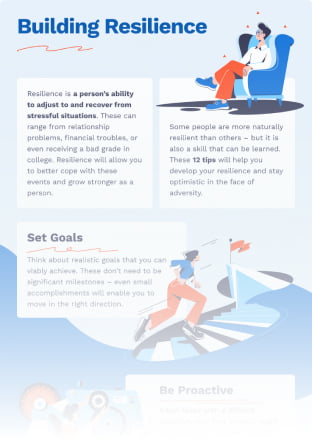
Feel free to use this infographic as you wish, just don't forget to add a link!

Frequently Asked Questions
Where does studycorgi get their essay samples.
These essays are submitted voluntarily to StudyCorgi by high-achieving students who wish to help others succeed academically in high school and university.
Do you really provide 100% free essays? No hidden paywalls?
Yes, the examples that StudyCorgi delivers are completely free. Keep in mind, though, that these papers are meant for research purposes only.
Can I submit one of the essays as my own?
Absolutely not. This would be considered academic dishonesty. We’re strictly against it, and won’t support it in any way or form.
Is there a way to get an essay sample on a specific topic? Do you take requests?
We don’t take requests, but our database is quite large. Consider reviewing our selection every once in a while, as we post new essay examples regularly. You might just find what you need.
Can I send you an essay?
Yes, you can. There’s a page on our website you can visit and fill out a form to donate your paper. We’ll review it, and if it fits our requirements, the work will be published shortly.
How do you ensure the quality of these papers?
We have a team of editors who check all the papers that get submitted and make sure they contain a minimum of grammatical, stylistic, and factual errors. They also see whether those essays adhere to a particular citation style.
What topics do your papers cover?
It’s easier to say what topics we do not cover. Our database is huge, with tens of thousands of works, covering almost every study-related topic imaginable - from the simplest essays describing life experiences and points of view, to works on genetic engineering and microbiology.
How do I properly use the examples you provide?
You can use our samples as a source of inspiration or as part of your investigation into a topic. You can utilize the references in each sample as a starting point for your own research. If you want to use information from the essay itself, you should properly cite it in accordance with your citation style requirements. There’s a useful citation tool at the bottom of each essay sample page to do just that.
Essay Writing Guide
Essay Outline
Last updated on: Jun 28, 2024
A Complete Essay Outline - Guidelines and Format
By: Nova A.
13 min read
Reviewed By: Melisa C.
Published on: Jan 15, 2019

To write an effective essay, you need to create a clear and well-organized essay outline. An essay outline will shape the essay’s entire content and determine how successful the essay will be.
In this blog post, we'll be going over the basics of essay outlines and provide a template for you to follow. We will also include a few examples so that you can get an idea about how these outlines look when they are put into practice.
Essay writing is not easy, but it becomes much easier with time, practice, and a detailed essay writing guide. Once you have developed your outline, everything else will come together more smoothly.
The key to success in any area is preparation - take the time now to develop a solid outline and then write your essays!
So, let’s get started!

On this Page
What is an Essay Outline?
An essay outline is your essay plan and a roadmap to essay writing. It is the structure of an essay you are about to write. It includes all the main points you have to discuss in each section along with the thesis statement.
Like every house has a map before it is constructed, the same is the importance of an essay outline. You can write an essay without crafting an outline, but you may miss essential information, and it is more time-consuming.
Once the outline is created, there is no chance of missing any important information. Also, it will help you to:
- Organize your thoughts and ideas.
- Understand the information flow.
- Never miss any crucial information or reference.
- Finish your work faster.
These are the reasons if someone asks you why an essay outline is needed. Now there are some points that must be kept in mind before proceeding to craft an essay outline.

Easily Outline Your Essays In Seconds!
Prewriting Process of Essay Outline
Your teacher may ask you to submit your essay outline before your essay. Therefore, you must know the preliminary guidelines that are necessary before writing an essay outline.
Here are the guidelines:
- You must go through your assignments’ guidelines carefully.
- Understand the purpose of your assignment.
- Know your audience.
- Mark the important point while researching your topic data.
- Select the structure of your essay outline; whether you are going to use a decimal point bullet or a simple one.

Paper Due? Why Suffer? That's our Job!
How to Write an Essay Outline in 4 Steps
Creating an essay outline is a crucial step in crafting a well-structured and organized piece of writing. Follow these four simple steps to create an effective outline:
Step 1: Understand the Topic
To begin, thoroughly grasp the essence of your essay topic.
Break it down into its key components and identify the main ideas you want to convey. This step ensures you have a clear direction and focus for your essay.
Step 2: Brainstorm and Gather Ideas
Let your creativity flow and brainstorm ideas related to your topic.
Jot down key pieces of information, arguments, and supporting evidence that will strengthen your essay's overall message. Consider different perspectives and potential counterarguments to make your essay well-rounded.
Step 3: Organize Your Thoughts
Now it's time to give structure to your ideas.
Arrange your main points in a logical order, starting with an attention-grabbing introduction, followed by body paragraphs that present your arguments.
Finally, tie everything together with a compelling conclusion. Remember to use transitional phrases to create smooth transitions between sections.
Step 4: Add Depth with Subpoints
To add depth and clarity to your essay, incorporate subpoints under each main point.
These subpoints provide more specific details, evidence, or examples that support your main ideas. They help to further strengthen your arguments and make your essay more convincing.
By following these four steps - you'll be well on your way to creating a clear and compelling essay outline.
Essay Outline Format
It is an easy way for you to write your thoughts in an organized manner. It may seem unnecessary and unimportant, but it is not.
It is one of the most crucial steps for essay writing as it shapes your entire essay and aids the writing process.
An essay outline consists of three main parts:
1. Introduction
The introduction body of your essay should be attention-grabbing. It should be written in such a manner that it attracts the reader’s interest. It should also provide background information about the topic for the readers.
You can use a dramatic tone to grab readers’ attention, but it should connect the audience to your thesis statement.
Here are some points without which your introduction paragraph is incomplete.
To attract the reader with the first few opening lines, we use a hook statement. It helps engage the reader and motivates them to read further. There are different types of hook sentences ranging from quotes, rhetorical questions to anecdotes and statistics, and much more.
Are you struggling to come up with an interesting hook? View these hook examples to get inspired!
A thesis statement is stated at the end of your introduction. It is the most important statement of your entire essay. It summarizes the purpose of the essay in one sentence.
The thesis statement tells the readers about the main theme of the essay, and it must be strong and clear. It holds the entire crux of your essay.
Need help creating a strong thesis statement? Check out this guide on thesis statements and learn to write a statement that perfectly captures your main argument!
2. Body Paragraphs
The body paragraphs of an essay are where all the details and evidence come into play. This is where you dive deep into the argument, providing explanations and supporting your ideas with solid evidence.
If you're writing a persuasive essay, these paragraphs will be the powerhouse that convinces your readers. Similarly, in an argumentative essay, your body paragraphs will work their magic to sway your audience to your side.
Each paragraph should have a topic sentence and no more than one idea. A topic sentence is the crux of the contents of your paragraph. It is essential to keep your reader interested in the essay.
The topic sentence is followed by the supporting points and opinions, which are then justified with strong evidence.
3. Conclusion
When it comes to wrapping up your essay, never underestimate the power of a strong conclusion. Just like the introduction and body paragraphs, the conclusion plays a vital role in providing a sense of closure to your topic.
To craft an impactful conclusion, it's crucial to summarize the key points discussed in the introduction and body paragraphs. You want to remind your readers of the important information you shared earlier. But keep it concise and to the point. Short, powerful sentences will leave a lasting impression.
Remember, your conclusion shouldn't drag on. Instead, restate your thesis statement and the supporting points you mentioned earlier. And here's a pro tip: go the extra mile and suggest a course of action. It leaves your readers with something to ponder or reflect on.
5 Paragraph Essay Outline Structure
An outline is an essential part of the writing as it helps the writer stay focused. A typical 5 paragraph essay outline example is shown here. This includes:
- State the topic
- Thesis statement
- Introduction
- Explanation
- A conclusion that ties to the thesis
- Summary of the essay
- Restate the thesis statement
Tough Essay Due? Hire Tough Writers!
Essay Outline Template
The outline of the essay is the skeleton that you will fill out with the content. Both outline and relevant content are important for a good essay. The content you will add to flesh out the outline should be credible, relevant, and interesting.
The outline structure for the essay is not complex or difficult. No matter which type of essay you write, you either use an alphanumeric structure or a decimal structure for the outline.
Below is an outline sample that you can easily follow for your essay.
|
Essay Outline Sample
Essay Outline Examples
An essay outline template should follow when you start writing the essay. Every writer should learn how to write an outline for every type of essay and research paper.
Essay outline 4th grade
Essay outline 5th grade
Essay outline high school
Essay outline college
Given below are essay outline examples for different types of essay writing.
Argumentative Essay Outline
An argumentative essay is a type of essay that shows both sides of the topic that you are exploring. The argument that presents the basis of the essay should be created by providing evidence and supporting details.
Persuasive Essay Outline
A persuasive essay is similar to an argumentative essay. Your job is to provide facts and details to create the argument. In a persuasive essay, you convince your readers of your point of view.
Compare and Contrast Essay Outline
A compare and contrast essay explains the similarities and differences between two things. While comparing, you should focus on the differences between two seemingly similar objects. While contrasting, you should focus on the similarities between two different objects.
Narrative Essay Outline
A narrative essay is written to share a story. Normally, a narrative essay is written from a personal point of view in an essay. The basic purpose of the narrative essay is to describe something creatively.
Expository Essay Outline
An expository essay is a type of essay that explains, analyzes, and illustrates something for the readers. An expository essay should be unbiased and entirely based on facts. Be sure to use academic resources for your research and cite your sources.
Analytical Essay Outline
An analytical essay is written to analyze the topic from a critical point of view. An analytical essay breaks down the content into different parts and explains the topic bit by bit.
Rhetorical Analysis Essay Outline
A rhetorical essay is written to examine the writer or artist’s work and develop a great essay. It also includes the discussion.
Cause and Effect Essay Outline
A cause and effect essay describes why something happens and examines the consequences of an occurrence or phenomenon. It is also a type of expository essay.
Informative Essay Outline
An informative essay is written to inform the audience about different objects, concepts, people, issues, etc.
The main purpose is to respond to the question with a detailed explanation and inform the target audience about the topic.
Synthesis Essay Outline
A synthesis essay requires the writer to describe a certain unique viewpoint about the issue or topic. Create a claim about the topic and use different sources and information to prove it.
Literary Analysis Essay Outline
A literary analysis essay is written to analyze and examine a novel, book, play, or any other piece of literature. The writer analyzes the different devices such as the ideas, characters, plot, theme, tone, etc., to deliver his message.
Definition Essay Outline
A definition essay requires students to pick a particular concept, term, or idea and define it in their own words and according to their understanding.
Descriptive Essay Outline
A descriptive essay is a type of essay written to describe a person, place, object, or event. The writer must describe the topic so that the reader can visualize it using their five senses.
Evaluation Essay Outline
Problem Solution Essay Outline
In a problem-solution essay, you are given a problem as a topic and you have to suggest multiple solutions on it.
Scholarship Essay Outline
A scholarship essay is required at the time of admission when you are applying for a scholarship. Scholarship essays must be written in a way that should stand alone to help you get a scholarship.
Reflective Essay Outline
A reflective essay is written to express your own thoughts and point of view regarding a specific topic.
Getting started on your essay? Give this comprehensive essay writing guide a read to make sure you write an effective essay!
With this complete guide, now you understand how to create an outline for your essay successfully. However, if you still can’t write an effective essay, then the best option is to consult a professional academic writing service.
Essay writing is a dull and boring task for some people. So why not get some help instead of wasting your time and effort? 5StarEssays.com is here to help you. All your do my essay for me requests are managed by professional essay writers.
Place your order now, and our team of expert academic writers will help you.
Frequently Asked Questions
What are the three types of outlines.
Here are the three types of essay outline;
- Working outline
- Speaking outline
- Full-sentence outline
All three types are different from each other and are used for different purposes.
What does a full-sentence outline look like?
A full sentence outline contains full sentences at each level of the essay’s outline. It is similar to an alphanumeric outline and it is a commonly used essay outline.
What is a traditional outline format?
A traditional essay outline begins with writing down all the important points in one place and listing them down and adding sub-topics to them. Besides, it will also include evidence and proof that you will use to back your arguments.
What is the benefit of using a traditional outline format and an informal outline format?
A traditional outline format helps the students in listing down all the important details in one palace while an informal outline will help you coming up with new ideas and highlighting important points

As a Digital Content Strategist, Nova Allison has eight years of experience in writing both technical and scientific content. With a focus on developing online content plans that engage audiences, Nova strives to write pieces that are not only informative but captivating as well.
Was This Blog Helpful?
Keep reading.
- How to Write an Essay - A Complete Guide with Examples

- The Art of Effective Writing: Thesis Statements Examples and Tips

- Writing a 500 Word Essay - Easy Guide

- What is a Topic Sentence - An Easy Guide with Writing Steps & Examples

- 220 Best Transition Words for Essays

- Essay Format: Detailed Writing Tips & Examples

- How to Write a Conclusion - Examples & Tips

- Essay Topics: 100+ Best Essay Topics for your Guidance

- How to Title an Essay: A Step-by-Step Guide for Effective Titles

- How to Write a Perfect 1000 Word Essay

- How To Make An Essay Longer - Easy Guide For Beginners

- Learn How to Start an Essay Effectively with Easy Guidelines

- Types of Sentences With Examples

- Hook Examples: How to Start Your Essay Effectively

- Essay Writing Tips - Essential Do’s and Don’ts to Craft Better Essays

- How To Write A Thesis Statement - A Step by Step Guide

- Art Topics - 200+ Brilliant Ideas to Begin With

- Writing Conventions and Tips for College Students

People Also Read
- definition essay writing
- essay outline
- poetry writing
- qualitative vs quantitative research
- expository essay writing
Burdened With Assignments?

Advertisement
- Homework Services: Essay Topics Generator
© 2024 - All rights reserved
Did you know the word ‘essay’ is derived from a Latin word ‘exagium’, which roughly translates to presenting one’s case? So essays are a short piece of writing representing one’s side of the argument or one’s experiences, stories, etc. Essays are very personalized. So let us learn about types of essays, format, and tips for essay-writing.
Suggested Videos

An essay is generally a short piece of writing outlining the writer’s perspective or story . It is often considered synonymous with a story or a paper or an article. Essays can be formal as well as informal. Formal essays are generally academic in nature and tackle serious topics. We will be focusing on informal essays which are more personal and often have humorous elements.
Browse more Topics under Writing
- Descriptive Essay
- Diary Entry
- Formal Letters
- Informal Letters
- Letter Writing
- Non-Classified/Display Advertisements
- Story: Characters
- Story: Setting
Get 500+ Essay Topics and Ideas for College and School Students here .
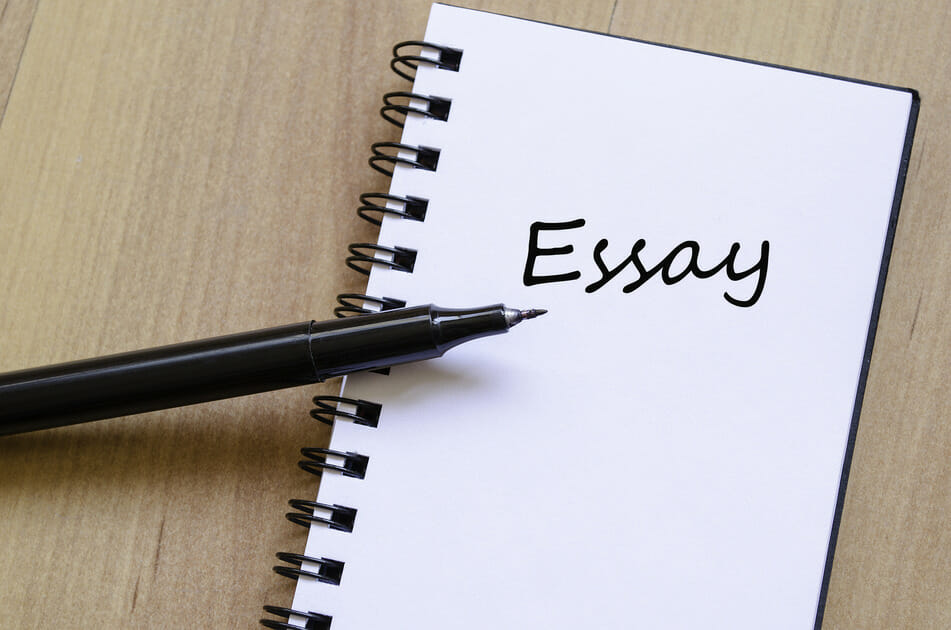
(Source: thewritelife)
Types of Essays
The type of essay will depend on what the writer wants to convey to his reader. There are broadly four types of essays. Let us see.
- Narrative Essays: This is when the writer is narrating an incident or story through the essay. So these are in the first person. The aim when writing narrative essays is to involve the reader in them as if they were right there when it was happening. So make them as vivid and real as possible. One way to make this possible is to follow the principle of ‘show, don’t tell’. So you must involve the reader in the story.
- Descriptive Essays : Here the writer will describe a place, an object, an event or maybe even a memory. But it is not just plainly describing things. The writer must paint a picture through his words. One clever way to do that is to evoke the senses of the reader. Do not only rely on sight but also involve the other senses of smell, touch, sound etc. A descriptive essay when done well will make the reader feel the emotions the writer was feeling at the moment.
- Expository Essays: In such an essay a writer presents a balanced study of a topic. To write such an essay, the writer must have real and extensive knowledge about the subject. There is no scope for the writer’s feelings or emotions in an expository essay. It is completely based on facts, statistics, examples etc. There are sub-types here like contrast essays, cause and effect essays etc.
- Persuasive Essays : Here the purpose of the essay is to get the reader to your side of the argument. A persuasive essay is not just a presentation of facts but an attempt to convince the reader of the writer’s point of view. Both sides of the argument have to presented in these essays. But the ultimate aim is to persuade the readers that the writer’s argument carries more weight.
Learn more about Letter Writing here in detail .
Format of an Essay
Now there is no rigid format of an essay. It is a creative process so it should not be confined within boundaries. However, there is a basic structure that is generally followed while writing essays. So let us take a look at the general structure of an essay.
Introduction
This is the first paragraph of your essay. This is where the writer introduces his topic for the very first time. You can give a very brief synopsis of your essay in the introductory paragraph. Some paragraph writing skills can be a help here. Generally, it is not very long, about 4-6 lines.
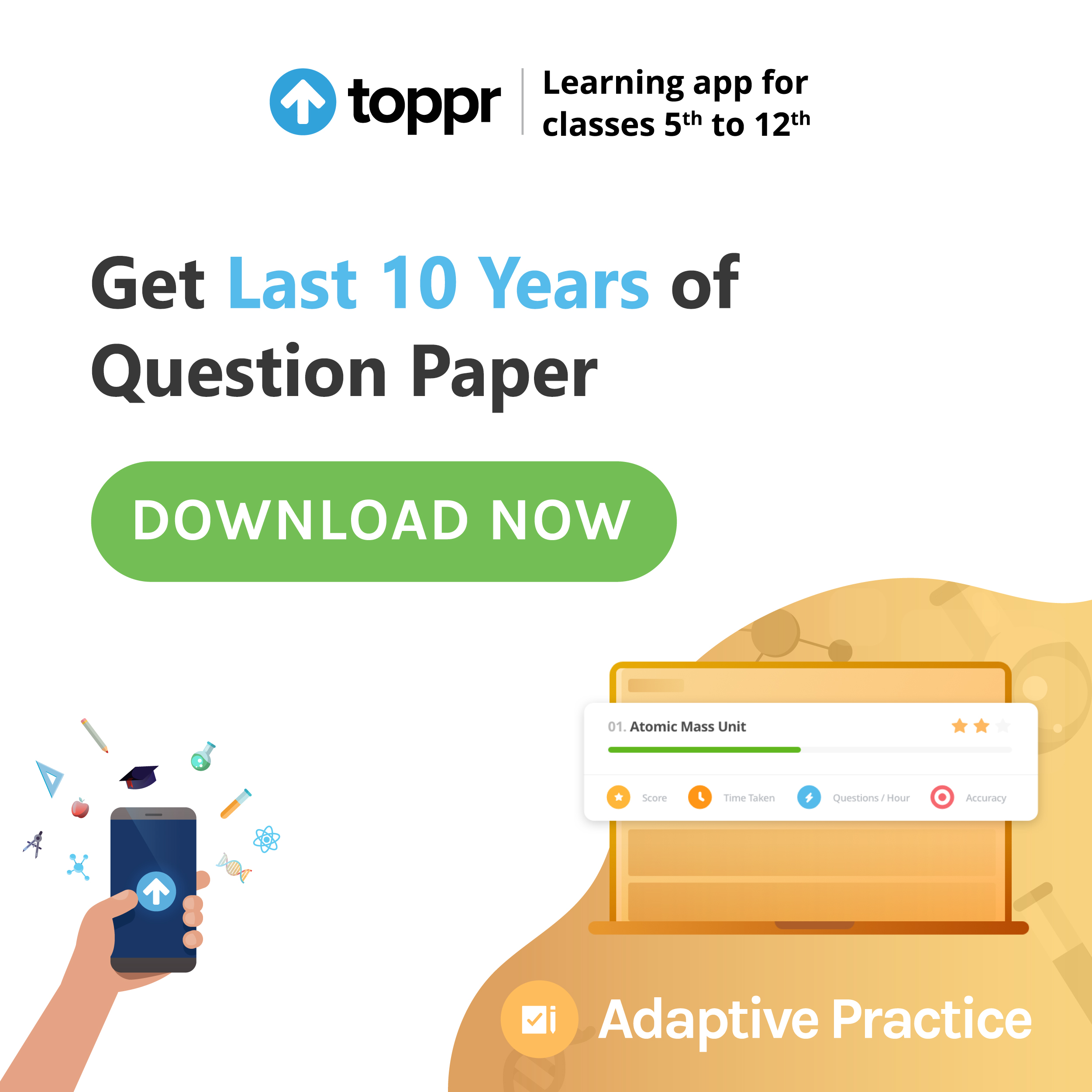
There is plenty of scopes to get creative in the introduction of essays. This will ensure that you hook the reader, i.e. draw and keep his attention. So to do so you can start with a quote or a proverb . Sometimes you can even start with a definition. Another interesting strategy to engage with your reader is to start with a question.
This is the main crux of your essays. The body is the meat of your essay sandwiched between the introduction and the conclusion. So the most vital and important content of the essay will be here. This need not be confined to one paragraph. It can extend to two or more paragraphs according to the content.
Usually, we have a lot of information to provide in the body. And the mistakes writers generally make is to go about it in a haphazard manner which leaves the reader confused. So it is important to organize your thoughts and content. Write the information in a systematic flow so that the reader can comprehend. So, for example, you were narrating an incident . The best manner to do this would be to go in a chronological order.
Learn more about Story Writing here in detail .
This is the last paragraph of the essay. Sometimes a conclusion will just mirror the introductory paragraph but make sure the words and syntax are different. A conclusion is also a great place to sum up a story or an argument. You can round up your essay by providing some moral or wrapping up a story. Make sure you complete your essays with the conclusion, leave no hanging threads.
Tips for Essay Writing
- Give your essays an interesting and appropriate title. It will help draw the attention of the reader and pique their curiosity
- Keep it between 300-500 words. This is the ideal length, you can take creative license to increase or decrease it
- Keep your language simple and crisp. Unnecessary complicated and difficult words break the flow of the sentence.
- Do not make grammar mistakes , use correct punctuation and spellings . If this is not done it will distract the reader from the content
- Before beginning the essay organize your thought and plot a rough draft . This way you can ensure the story will flow and not be an unorganized mess.
Solved Question for You
Q: What is a thesis statement of essays?
Ans: The thesis statement is a clear, one-sentence explanation of your position that leaves no doubt in the readers’ mind about which side you are on from the beginning of your essay.
Customize your course in 30 seconds
Which class are you in.

- Non-Classified or Display Advertisements
5 responses to “Story: Characters”
great article
very clean post.
awesome work
Leave a Reply Cancel reply
Your email address will not be published. Required fields are marked *
Download the App

Talk to our experts
1800-120-456-456
- Essay Writing

Introduction
In the simplest terms, an essay is a short piece of writing which is set around a specific topic or subject. The piece of writing will give information surrounding the topic but will also display the opinions and thoughts of the author. Oftentimes, an essay is used in an academic sense by way of examination to determine whether a student has understood their studies and as a way of testing their knowledge on a specific subject. An essay is also used in education as a way of encouraging a student to develop their writing skills.
Moreover; an essay is a focused piece of writing designed to inform or persuade. There are many different types of essays, but they are often defined in four categories: argumentative, expository, narrative, and descriptive essays. Argumentative and expository essays are focused on conveying information and making clear points, while narrative and descriptive essays are about exercising creativity and writing in an interesting way. At the university level, argumentative essays are the most common type.
Types of Essay Writing
When it comes to writing an essay, there is not simply one type, there are, quite a few types of essay, and each of them has its purpose and function which are as follows:
Narrative Essays
A narrative essay details a story, oftentimes from a particular point of view. When writing a narrative essay, you should include a set of characters, a location, a good plot, and a climax to the story. It is vital that when writing this type of essay you use fine details which will allow the reader to feel the emotion and use their senses but also give the story the chance to make a point.
Descriptive Essay
A descriptive essay will describe something in great detail. The subject can be anything from people and places to objects and events but the main point is to go into depth. You might describe the item’s color, where it came from, what it looks like, smells like, tastes like, or how it feels. It is very important to allow the reader to sense what you are writing about and allow them to feel some sort of emotion whilst reading. That being said, the information should be concise and easy to understand, the use of imagery is widely used in this style of essay.
Expository Essay
An expository essay is used as a way to look into a problem and therefore compare it and explore it. For the expository essay, there is a little bit of storytelling involved but this type of essay goes beyond that. The main idea is that it should explain an idea giving information and explanation. Your expository essay should be simple and easy to understand as well as give a variety of viewpoints on the subject that is being discussed. Often this type of essay is used as a way to detail a subject which is usually more difficult for people to understand, clearly and concisely.
Argumentative Essay
When writing an argumentative essay, you will be attempting to convince your reader about an opinion or point of view. The idea is to show the reader whether the topic is true or false along with giving your own opinion. You must use facts and data to back up any claims made within the essay.
Format of Essay Writing
Now there is no rigid format of an essay. It is a creative process so it should not be confined within boundaries. However, there is a basic structure that is generally followed while writing essays.
This is the first paragraph of your essay. This is where the writer introduces his topic for the very first time. You can give a very brief synopsis of your essay in the introductory paragraph. Generally, it is not very long, about 4-6 lines.
This is the main crux of your essays. The body is the meat of your essay sandwiched between the introduction and the conclusion. So the most vital content of the essay will be here. This need not be confined to one paragraph. It can extend to two or more paragraphs according to the content.
This is the last paragraph of the essay. Sometimes a conclusion will just mirror the introductory paragraph but make sure the words and syntax are different. A conclusion is also a great place, to sum up, a story or an argument. You can round up your essay by providing some morals or wrapping up a story. Make sure you complete your essays with the conclusion, leave no hanging threads.
Writing Tips
Give your essays an interesting and appropriate title. It will help draw the attention of the reader and pique their curiosity
Keep it between 300-500 words. This is the ideal length, you can take creative license to increase or decrease it
Keep your language simple and crisp. Unnecessary complicated and difficult words break the flow of the sentence.
Do not make grammar mistakes, use correct punctuation and spelling five-paragraph. If this is not done it will distract the reader from the content
Before beginning the essay, organize your thoughts and plot a rough draft. This way you can ensure the story will flow and not be an unorganized mess.
Understand the Topic Thoroughly-Sometimes we jump to a conclusion just by reading the topic once and later we realize that the topic was different than what we wrote about. Read the topic as many times as it takes for you to align your opinion and understanding about the topic.
Make Pointers-It is a daunting task to write an essay inflow as sometimes we tend to lose our way of explaining and get off-topic, missing important details. Thinking about all points you want to discuss and then writing them down somewhere helps in covering everything you hoped to convey in your essay.
Develop a Plan and Do The Math-Essays have word limits and you have to plan your content in such a way that it is accurate, well-described, and meets the word limit given. Keep a track of your words while writing so that you always have an idea of how much to write more or less.
Essays are the most important means of learning the structure of writing and presenting them to the reader.

FAQs on Essay Writing
1. Writing an Essay in a format is important?
Yes, it is important because it makes your content more streamlined and understandable by the reader. A set format gives a reader a clear picture of what you are trying to explain. It also organises your own thoughts while composing an essay as we tend to think and write in a haphazard manner. The format gives a structure to the writeup.
2. How does Essay writing improve our English?
Essay writing is a very important part of your English earning curriculum, as you understand how to describe anything in your words or how to put your point of view without losing its meaning
3. How do you write a good essay?
Start by writing a thorough plan. Ensure your essay has a clear structure and overall argument. Try to back up each point you make with a quotation. Answer the question in your introduction and conclusion but remember to be creative too.
4. What is the format of writing an essay?
A basic essay consists of three main parts: introduction, body, and conclusion. This basic essay format will help you to write and organize an essay. However, flexibility is important. While keeping this basic essay format in mind, let the topic and specific assignment guide the writing and organization.
5. How many paragraphs does an essay have?
The basic format for an essay is known as the five paragraph essay – but an essay may have as many paragraphs as needed. A five-paragraph essay contains five paragraphs. However, the essay itself consists of three sections: an introduction, a body, and a conclusion. Below we'll explore the basics of writing an essay.
6. Can you use the word you in an essay?
In academic or college writing, most formal essays and research reports use third-person pronouns and do not use “I” or “you.” An essay is the writer's analysis of a topic. “You” has no place in an essay since the essay is the writer's thoughts and not the reader's thoughts.
7. What does bridge mean in an essay?
A bridge sentence is a special kind of topic sentence. In addition to signaling what the new paragraph is about, it shows how that follows from what the old paragraph said. The key to constructing good bridges is briefly pointing back to what you just finished saying.

Essay Generator
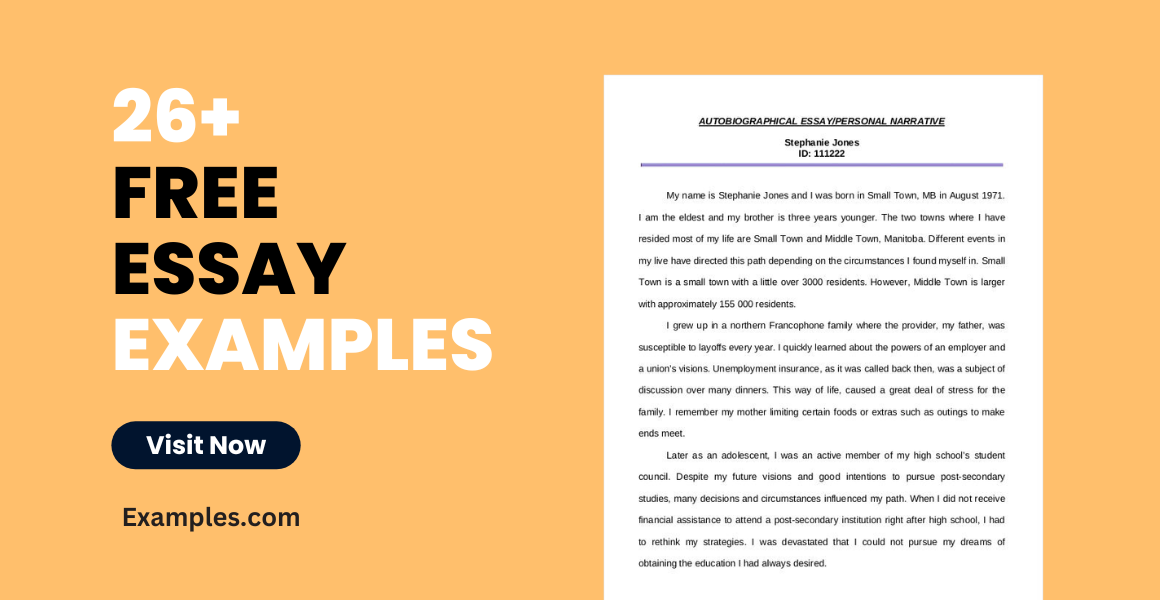
Embark on your essay writing journey with our comprehensive guide, rich in diverse essay examples. This guide is crafted to assist students, educators, and writing enthusiasts in mastering the art of essay composition. From structure to style, it covers all facets of essay writing, supplemented with illustrative essay examples for clear understanding. Whether for academic, professional, or personal purposes, this guide is an invaluable resource for anyone looking to enhance their essay writing skills with precision and creativity.
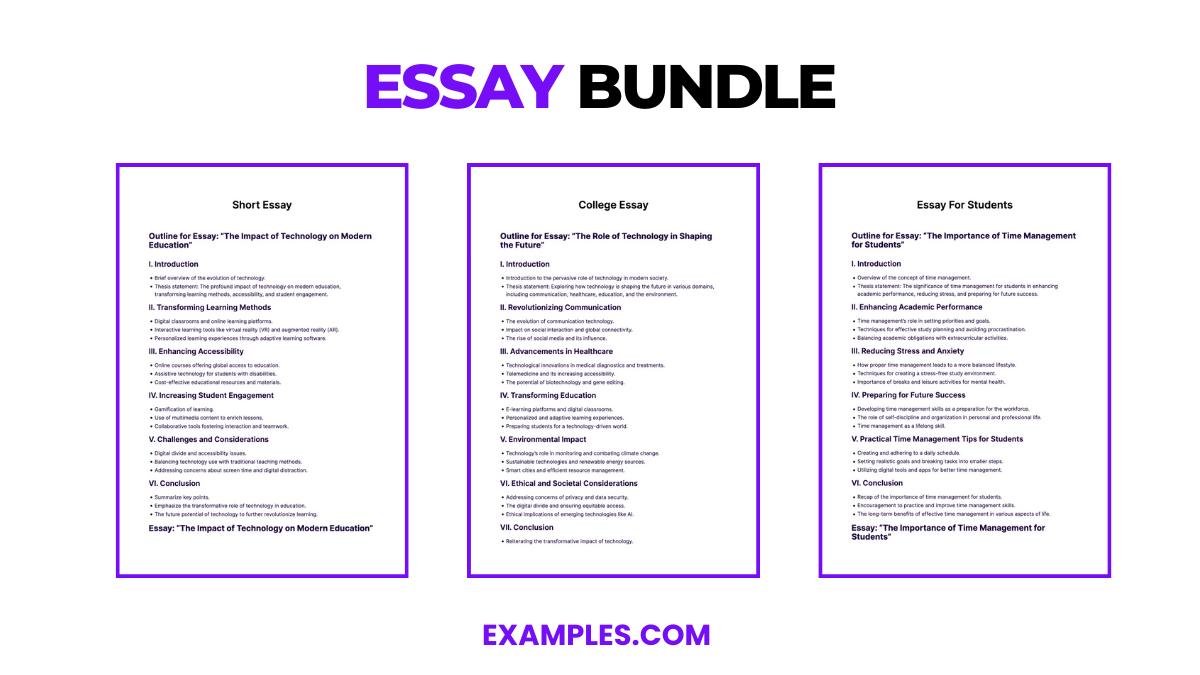
Download Essay Bundle
Most of us are probably familiar about what essays are. I would also have to assume that most of us have already written essays one even when we were younger. We were either tasked by our teacher to write one as a part of an examination or as a take-home project to be presented in the next session. Some consider essay writing a burden while others see it as an opportunity to express their thoughts and opinions. Because through writing, you get to write about things that you want others to know about and share a reflection through reflective essay . Your imagination becomes boundless and your ideas are limitless.
Short Essay Example
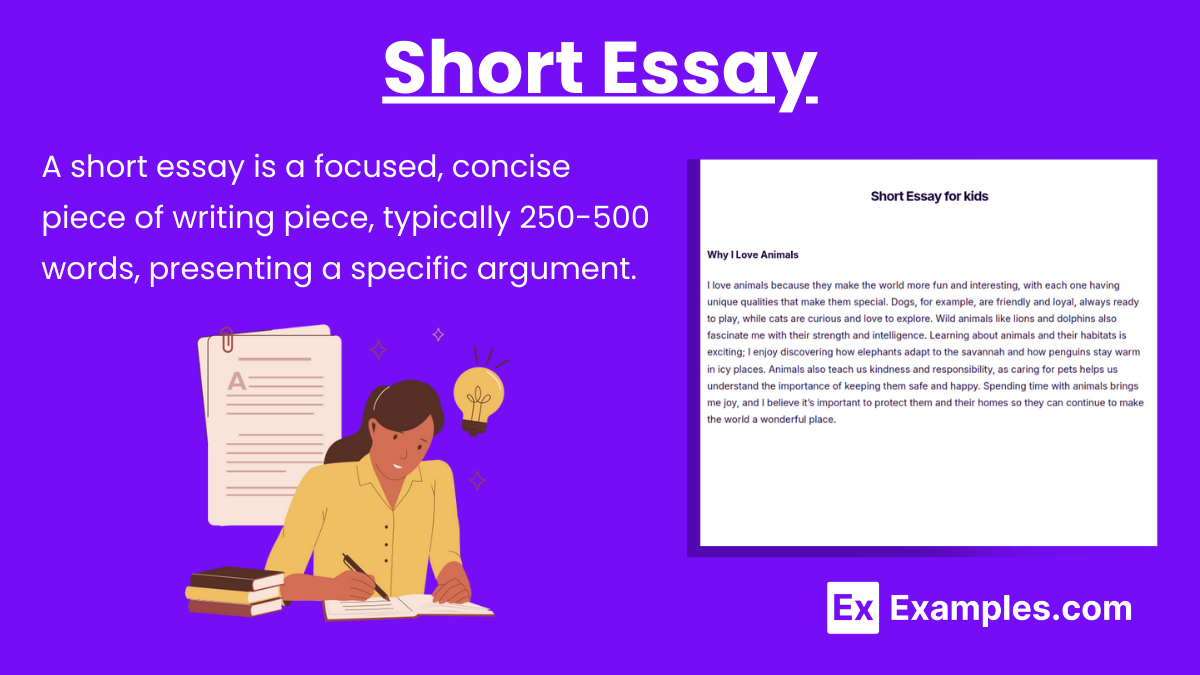
Free Download
College Essay
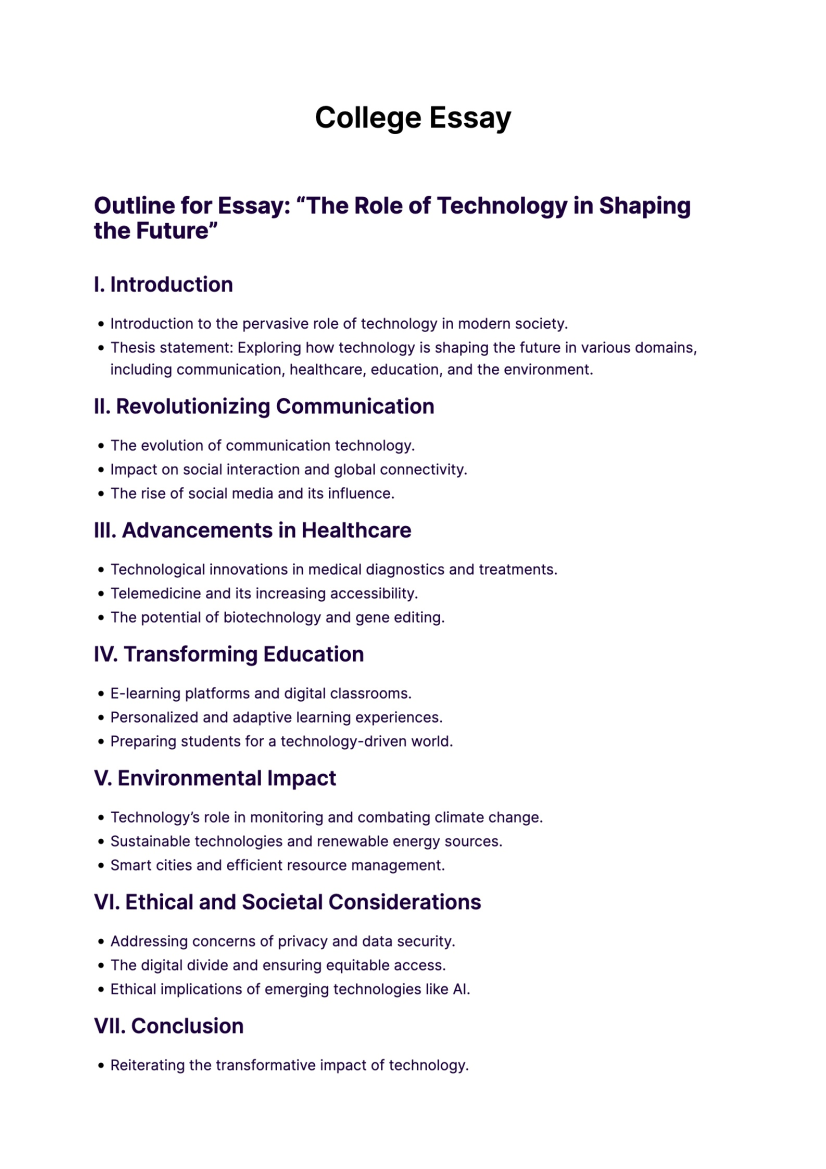
Essay For Students
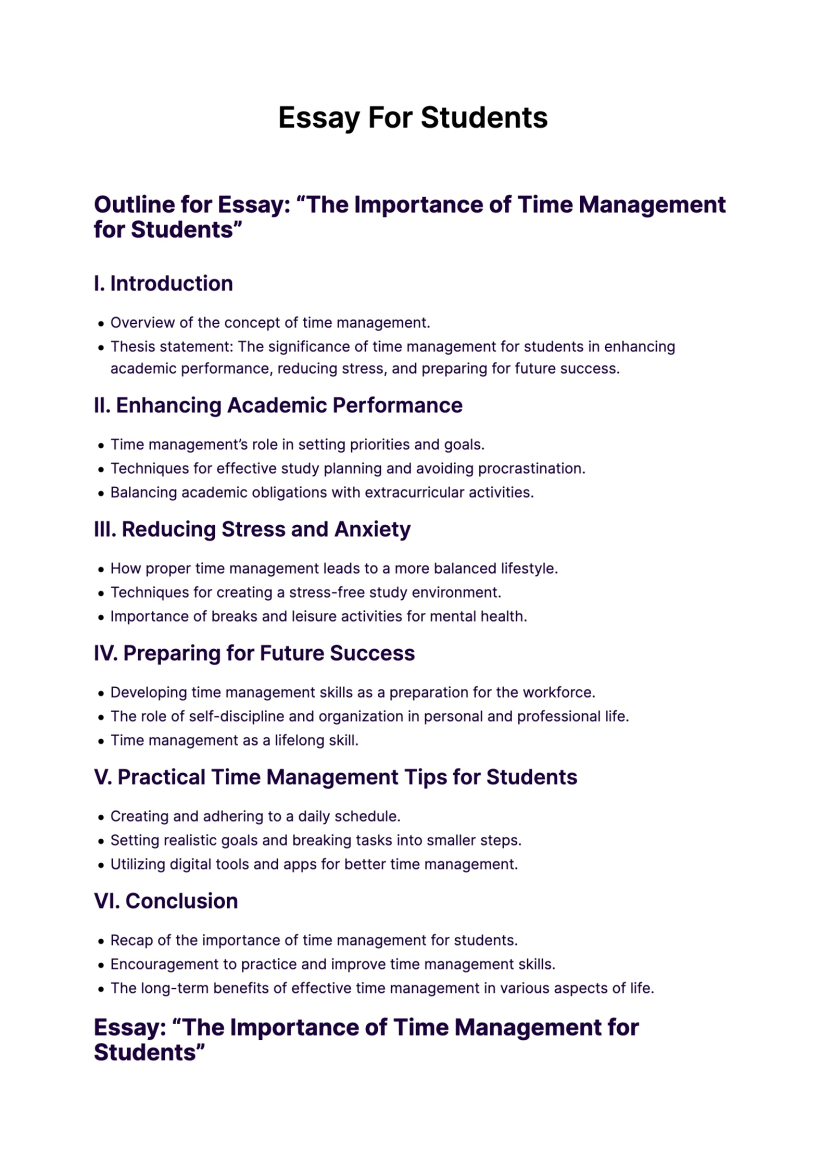
Free Biography Essay Outline Format Template
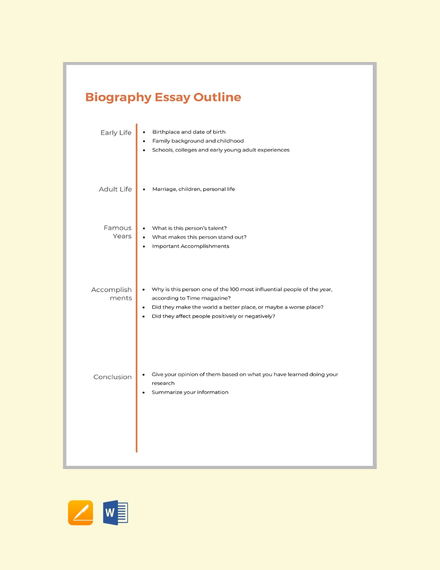
- Apple Pages
Free Essay Writing Plan Template
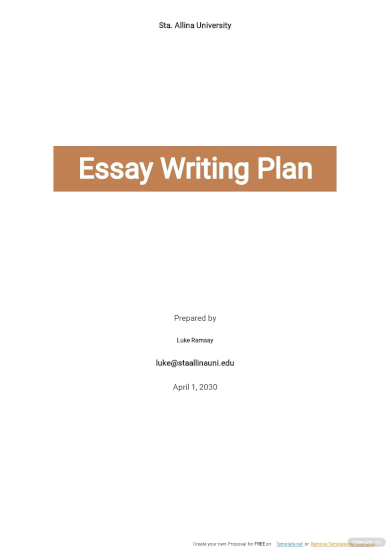
- Google Docs
Size: 24 KB
Free Essay Plan Mind Map Template
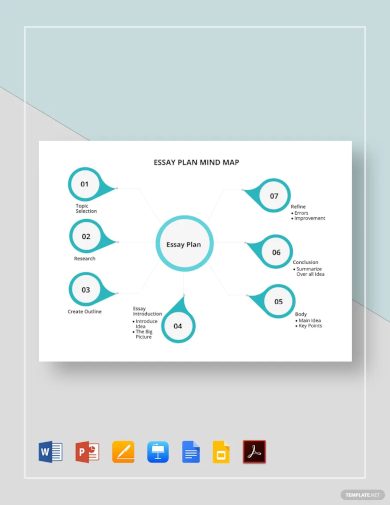
- Google Slides
- Apple Keynote
Size: 59 KB
Free Simple Essay Plan Template
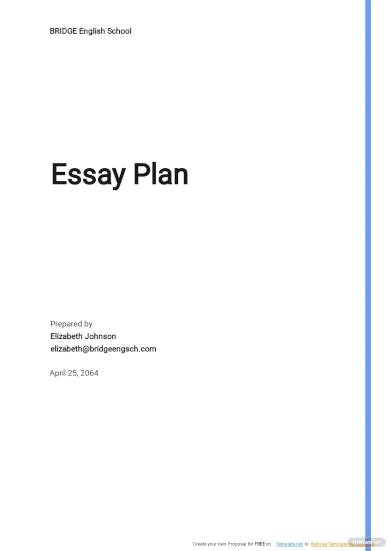
Size: 20 KB
Sample Illustration
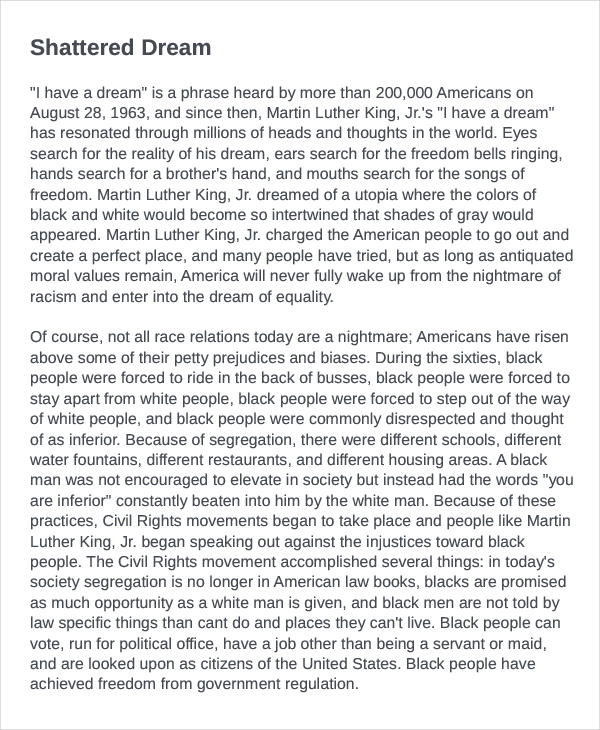
Size: 34 KB
Reflective Essay
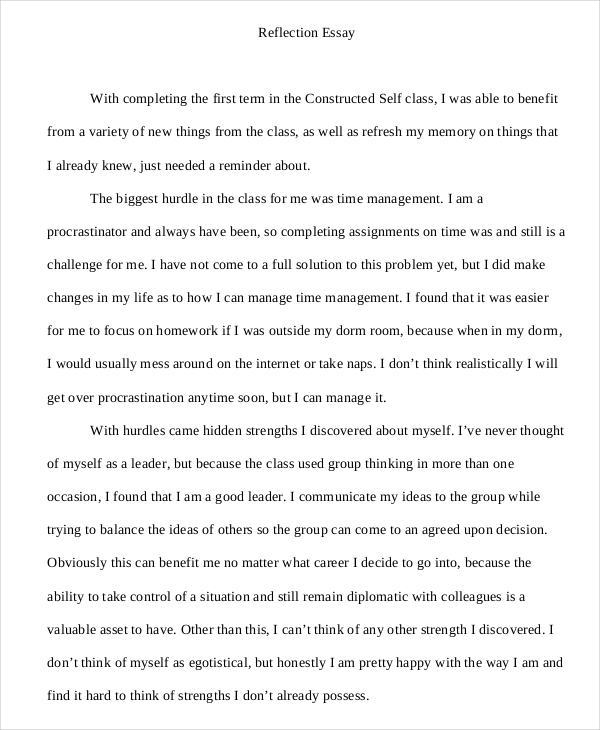
Autobiography Example
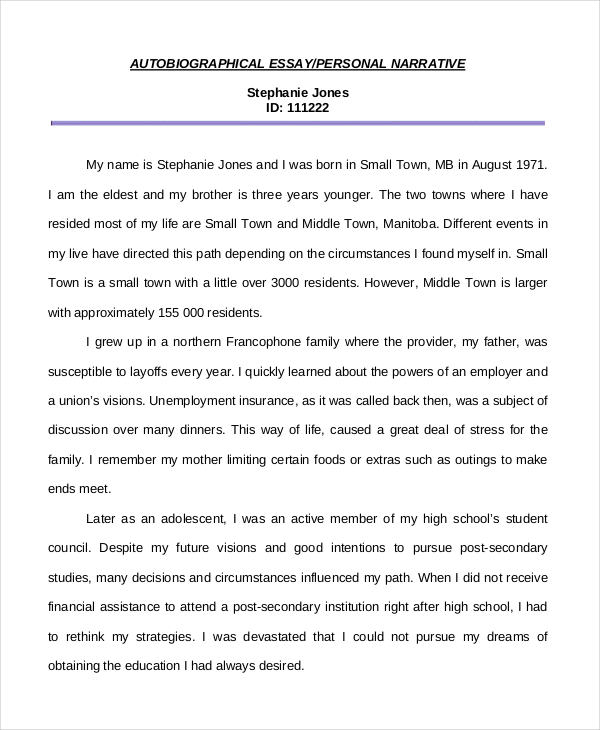
Size: 65 KB
Sample Descriptive
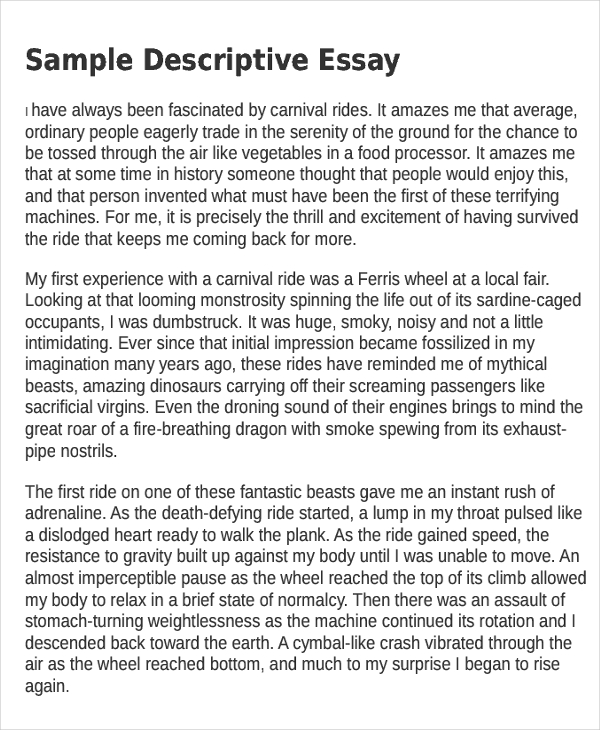
Size: 18 KB
What Is the Format of an Essay?
Essays, whichever type they come in, have a similar format. This serves as a guide for a writer to express his/her thoughts and ideas in a structured manner.
- Introduction. This is the opening part of the essay . It provides a brief overview and a preface of what the topic is all about. It is usually short but has to be interesting.
- Body. This is where the writer places his/her arguments and supporting statements for the topic. It can contain two to three paragraphs or depending on the length and scope of the subject.
- Conclusion. The summary writing of the whole essay is contained in the conclusion. It is a short recap of the main point presented in the essay.
How to Structure an Essay
To structure an essay, you need to simply follow the above format. Every essay, whether it be an informative essay or an analysis essay , has to contain the essential elements common among all essays. By following this format, the writer will have a guide to follow throughout the entire writing course.
It is a difficult process in essay writing when you do not have a structure to follow. You will have throw all of your ideas from here and there with no direction at all. Your paragraphs do not connect each other’s meaning as well as the entire thought of your essay could be incomprehensible.
Free Argumentative
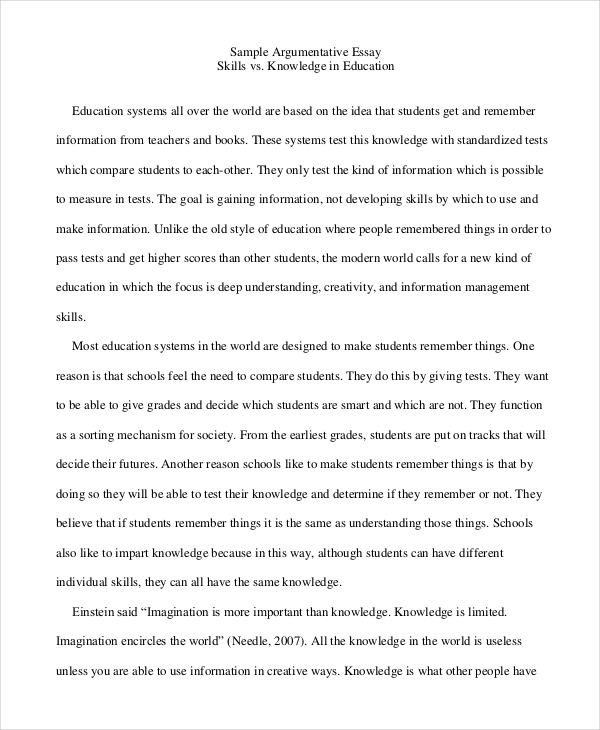
Size: 76 KB
Observation Essay
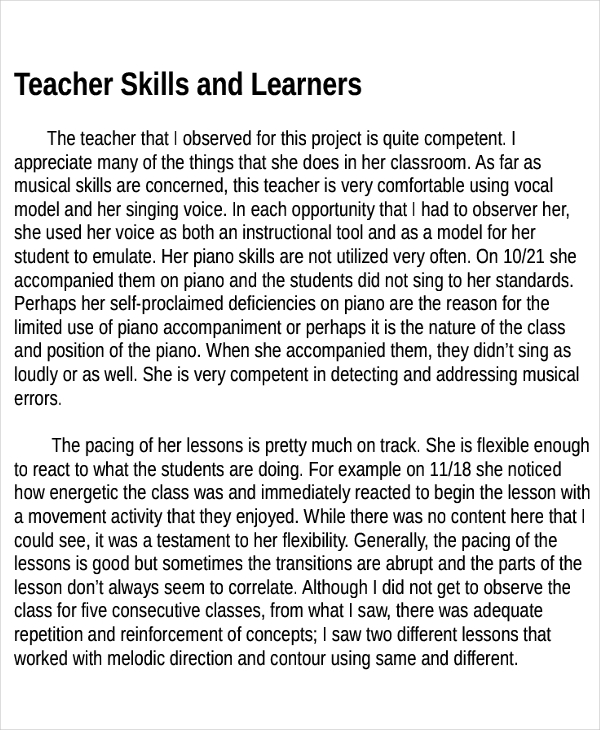
Free Response Sample
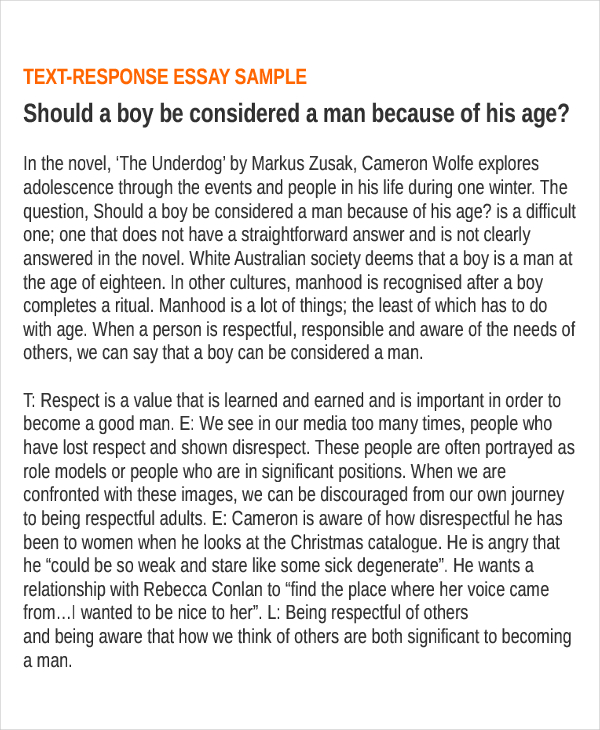
Size: 30 KB
Narrative Essay
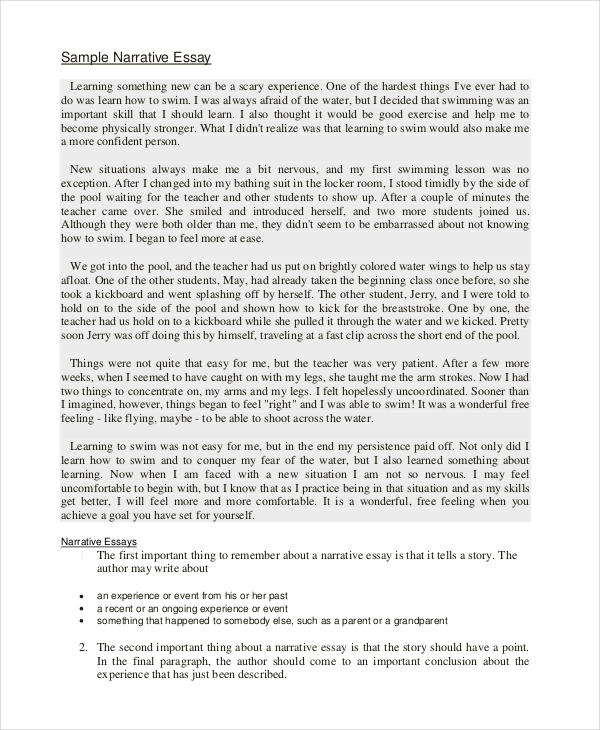
Size: 209 KB
Free Service Example
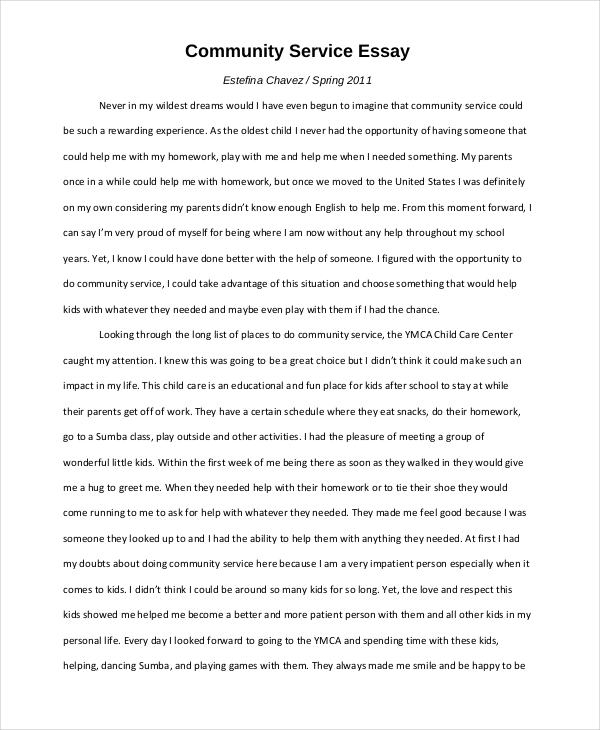
Size: 36 KB
Free Personal
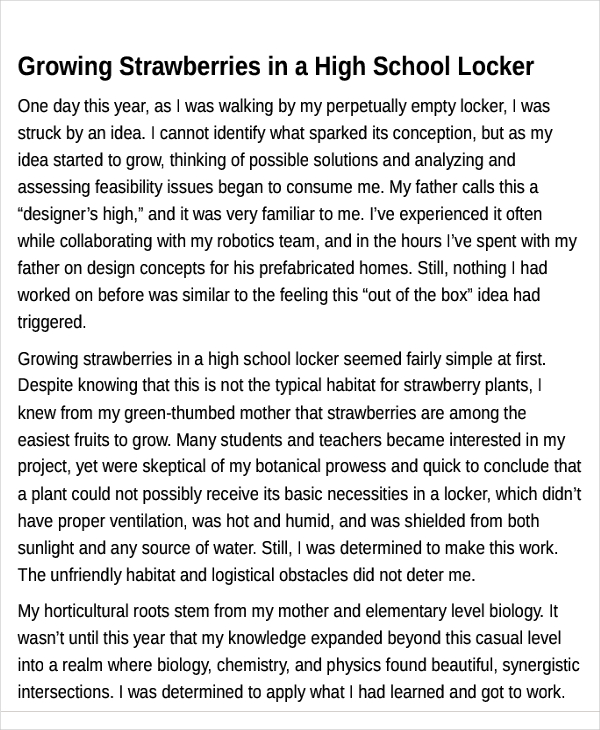
Size: 26 KB
Analytical Essay
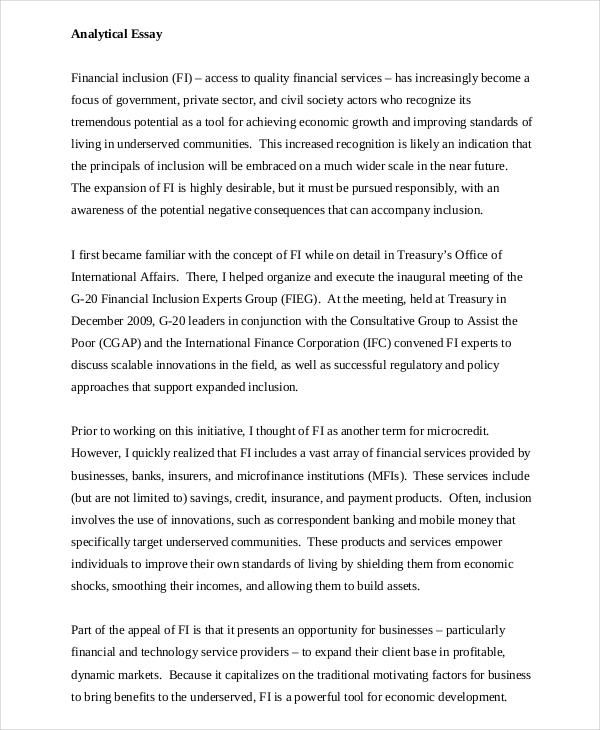
Size: 14 KB
Different Kinds of Essay
Writing an essay is a crucial part in academe life. You need to know how to write an effective essay as it is a common basis for a student’s grade. It is given as a common school assignment and a critical part in an examination set. To write an impressive short essay , especially during an examination, you need to be able to hit the question and provide a straightforward answer while at the same time observing the right structure of an essay.
Writing an essay could be difficult especially if you do not know the different kinds of essays which for sure, your teacher will be obliging you to write.
The easiest way to determine the type of an essay is to understand the writer’s point of view. Ask yourself what is the writer trying to tell and that by itself should provide a definite answer as to what type of essay it is. But to provide you a more comprehensible answer, here are the most common kinds of essay.
- Descriptive essay. A descriptive essay is aimed at portraying a picture through the use of words. The writer describes in great details a character, a place or a certain scenario which is directed at calling up the reader’s emotions.
- Reflective essay. In a reflective essay , the writer stirs the emotions of the readers by sharing a specific experience in life which is rather more important to him/her and which has a special place in his heart. It narrates a story and tells of the lessons and life-changing realizations drawn out from that experience.
- Expository essay. While a reflective essay deals on the emotions of the writer, an expository essay presents facts and verifiable data which presents a fair and unbiased analysis of a topic.
- Persuasive essay. The goal of persuasive essay is to present ideas and thoughts to readers and to convince them to believe or accept these. The writer aims at demonstrating his/her statements in a logical manner while at the same time appealing to the judgment of the readers.
Free Comparative Example
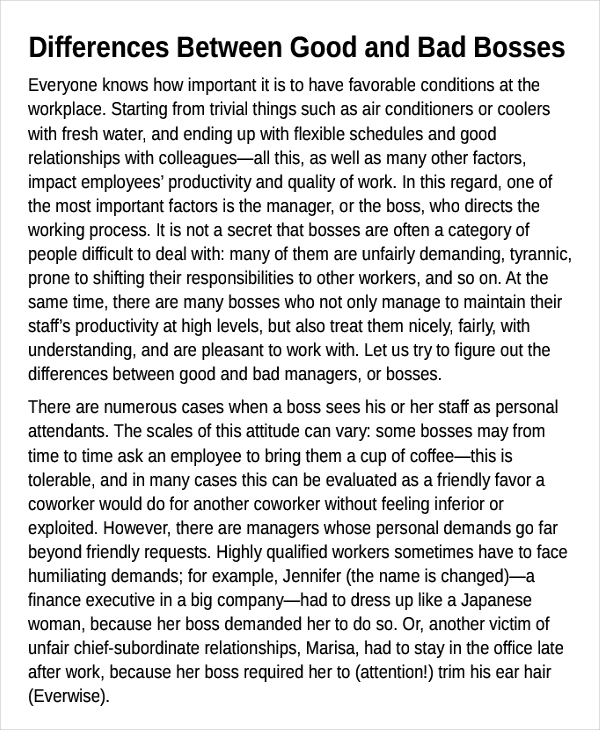
Size: 32 KB
Dialogue Essay
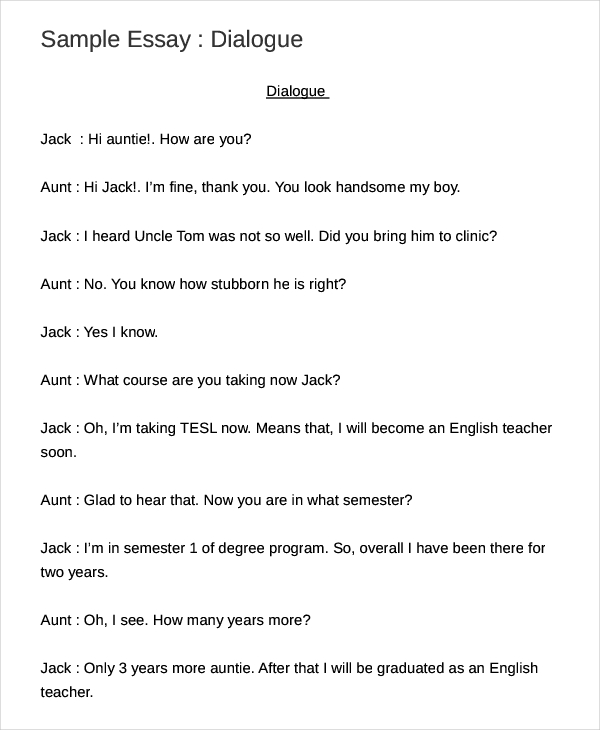
Free Economics Sample
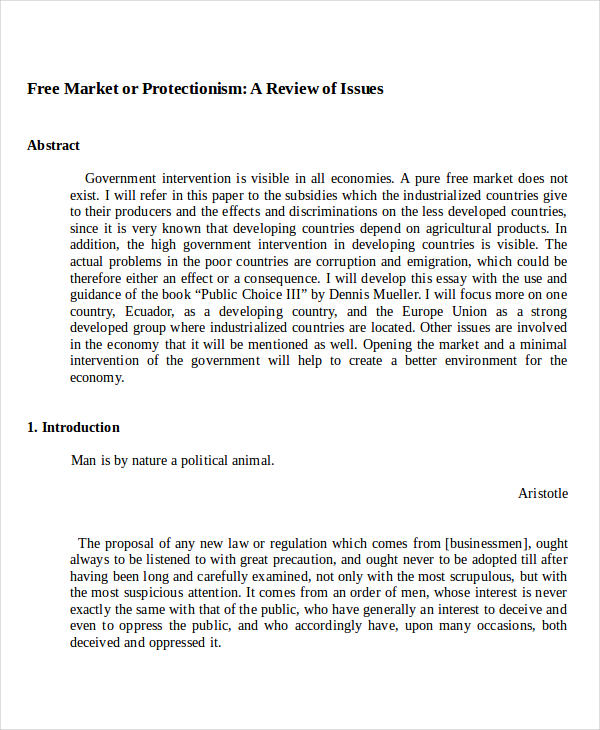
Size: 722 KB
Free Expository
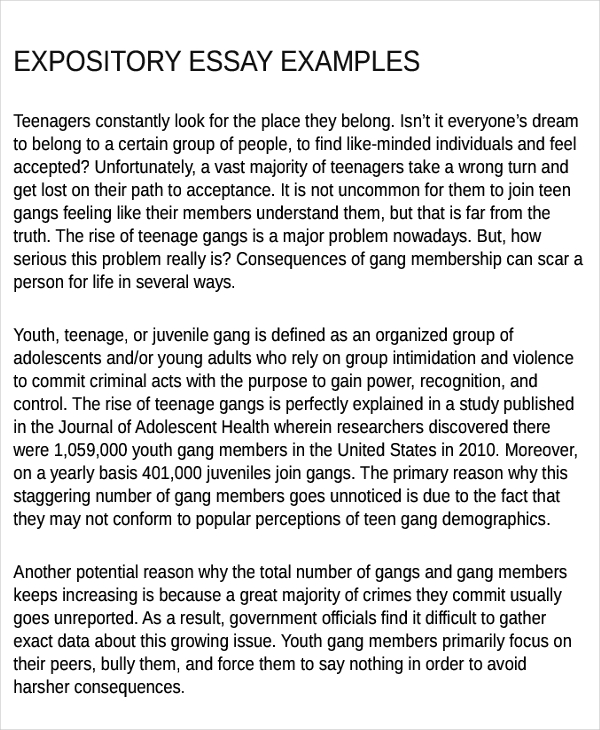
Size: 22 KB
Exploratory Example
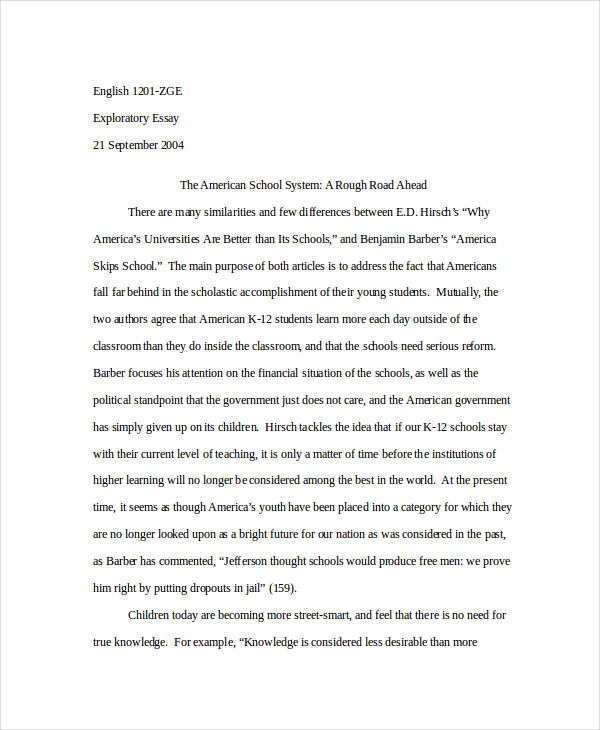
Importance of Essay
Essay writing is commonly practiced is schools. Students have to write essays depending on the teacher’s instructions or their desired style in writing.
Since there are different types of analysis essays , students can be creative and choose any style they want for as long as they can express their thoughts and of course, as long it as it is appropriate to what their teachers ask them to do.
However, essays have a very good importance not just to get good grades but also in expressing one’s emotions. An essay could be a channel for a student to workout his/her creative imagination and put it into writing.
Purpose of an Essay
We have all been through the struggles of having to think seriously of what to write about a topic that our teachers wanted us to write. I understand because I myself was at one time pressured because my classmates were all enthusiastic to write while I was sitting blank unsure of what I was supposed to do.
However, I realized that writing an content winning essay made me a better person. I was able to put into writing my thoughts which I have always kept in myself afraid of being laughed at. The purpose of an essay is to convey those emotions through words which we cannot do through actions.
Informative Essay
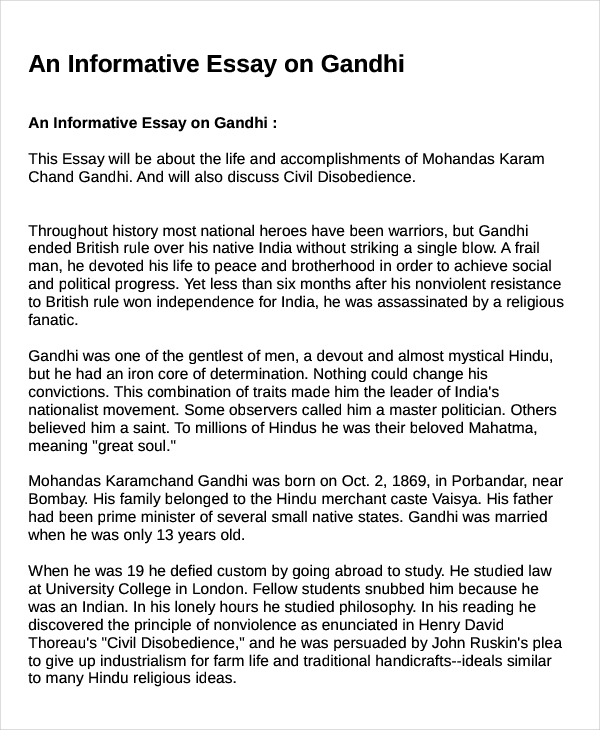
Free Leadership
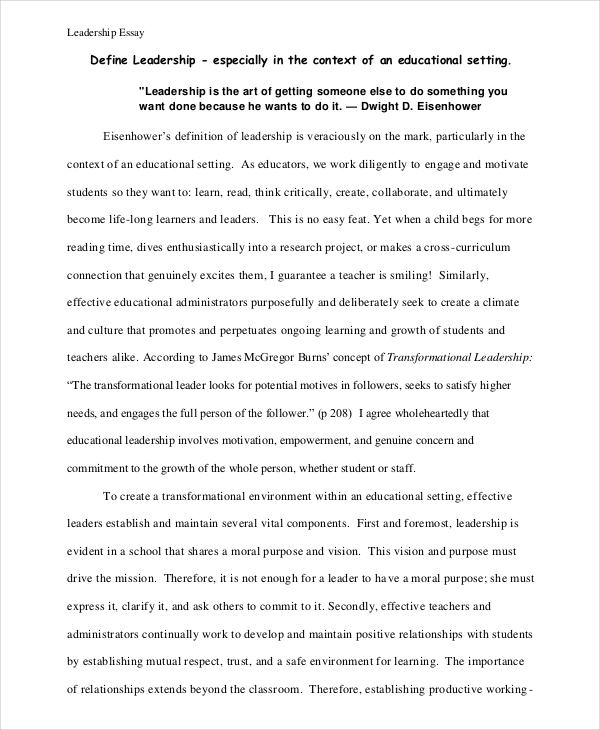
Size: 530 KB
Marketing Example
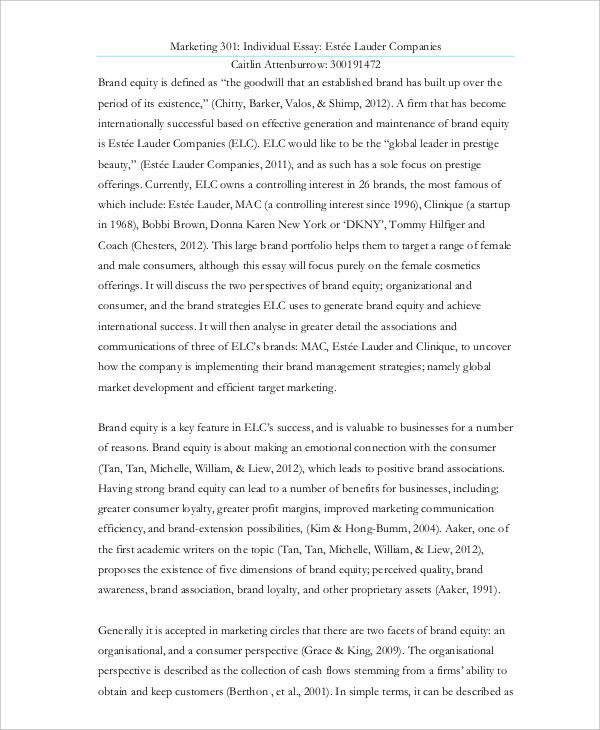
Nursing Essay
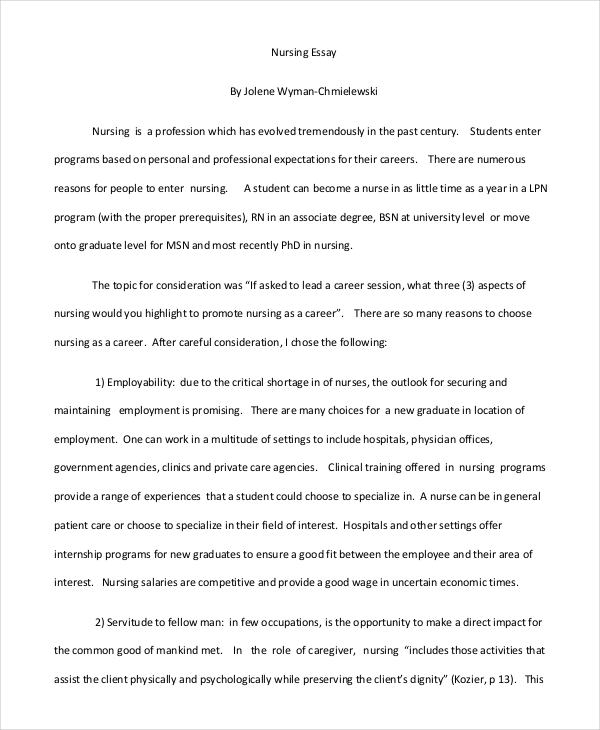
Size: 176 KB
Free Persuasive Sample
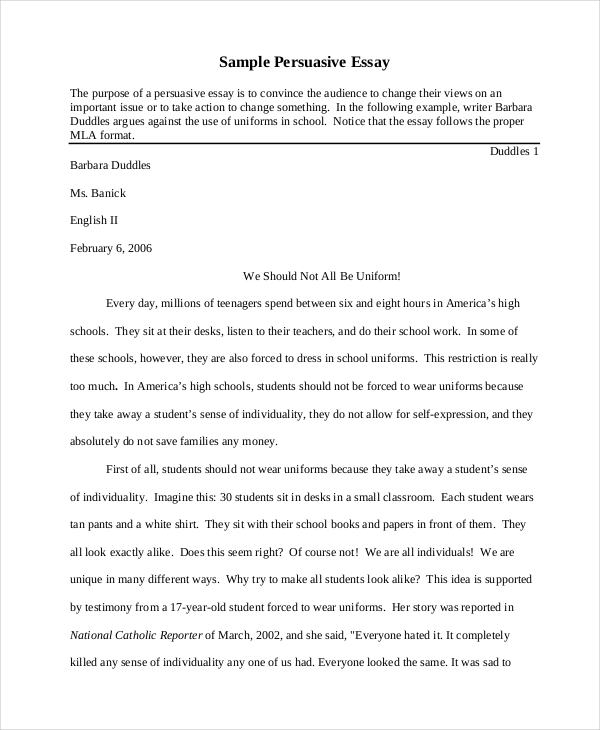
Process Essay Example
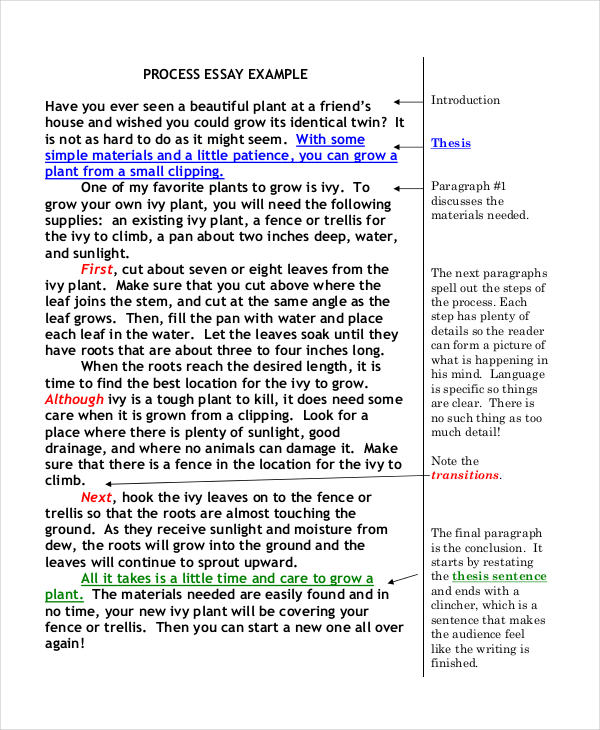
Size: 77 KB
Scholarship Essay
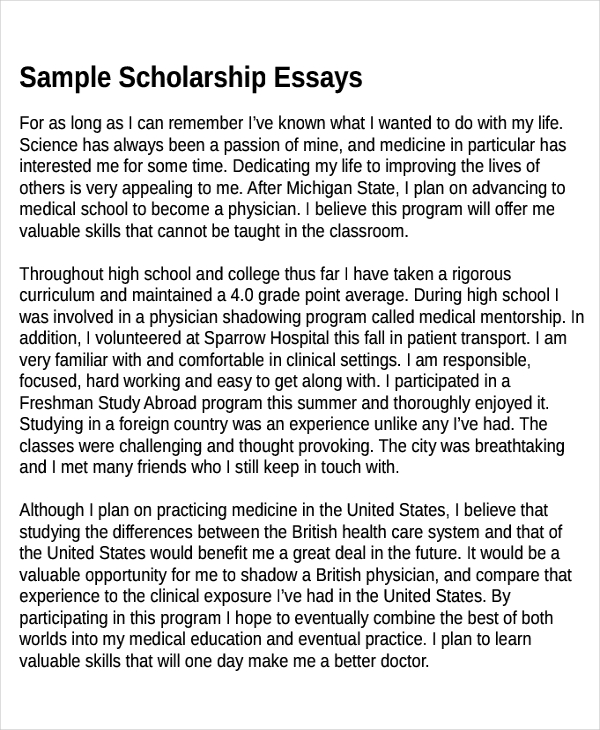
Guidelines for Essay Writing
Although we have to admit that writing an essay is not an easy task, being able to finish one is such a rewarding experience especially if it is an assignment you have to pass the next day. There is no perfect solution on how to write an effective essay .
However, there are certain guideline which you can use in order for you to make that outstanding essay.
- Choose your topic. Deciding what essay to write starts with choosing the right topic. Don’t just write something that everybody is interested to write about. Rather, pick a topic that you are most excited to write about so it would be easier for you to express your thoughts.
- Create a mind map . A mind map is a sketch of form or an essay outline used to organize information. This is best in order for you to logically express your thoughts and to present it in a coherent manner. Write your ideas in a draft paper and choose which ones to come first and which ones to use as your supporting arguments.
- Compose yourself. Having the right disposition is important in writing an essay. You need to have focus so that while you are writing, you are not distracted by outside thoughts which could ruin your momentum.
Our exploration of essay examples offers invaluable insights for effective essay writing. This guide has provided practical strategies and illustrative examples, empowering writers to craft compelling essays with confidence. Whether for academic achievement or personal expression, these tools and techniques are essential in navigating the diverse landscape of essay writing, ensuring your work is not only well-structured but also engaging and impactful.
Text prompt
- Instructive
- Professional
Write an Essay on the benefits of reading for personal development.
Create an Essay exploring the impact of climate change on global weather patterns.
- Share full article
Advertisement
Supported by
Guest Essay
George Clooney: I Love Joe Biden. But We Need a New Nominee.

By George Clooney
Mr. Clooney is an actor, director and film producer.
I’m a lifelong Democrat; I make no apologies for that. I’m proud of what my party represents and what it stands for. As part of my participation in the democratic process and in support of my chosen candidate, I have led some of the biggest fund-raisers in my party’s history. Barack Obama in 2012 . Hillary Clinton in 2016 . Joe Biden in 2020 . Last month I co-hosted the single largest fund-raiser supporting any Democratic candidate ever, for President Biden’s re-election. I say all of this only to express how much I believe in this process and how profound I think this moment is.
I love Joe Biden. As a senator. As a vice president and as president. I consider him a friend, and I believe in him. Believe in his character. Believe in his morals. In the last four years, he’s won many of the battles he’s faced.
But the one battle he cannot win is the fight against time. None of us can. It’s devastating to say it, but the Joe Biden I was with three weeks ago at the fund-raiser was not the Joe “ big F-ing deal ” Biden of 2010. He wasn’t even the Joe Biden of 2020. He was the same man we all witnessed at the debate.
Was he tired? Yes. A cold? Maybe. But our party leaders need to stop telling us that 51 million people didn’t see what we just saw. We’re all so terrified by the prospect of a second Trump term that we’ve opted to ignore every warning sign. The George Stephanopoulos interview only reinforced what we saw the week before. As Democrats, we collectively hold our breath or turn down the volume whenever we see the president, whom we respect, walk off Air Force One or walk back to a mic to answer an unscripted question.
Is it fair to point these things out? It has to be. This is about age. Nothing more. But also nothing that can be reversed. We are not going to win in November with this president. On top of that, we won’t win the House, and we’re going to lose the Senate. This isn’t only my opinion; this is the opinion of every senator and Congress member and governor who I’ve spoken with in private. Every single one, irrespective of what he or she is saying publicly.
We love to talk about how the Republican Party has ceded all power, and all of the traits that made it so formidable with Ronald Reagan and George H.W. Bush, to a single person who seeks to hold on to the presidency, and yet most of our members of Congress are opting to wait and see if the dam breaks. But the dam has broken. We can put our heads in the sand and pray for a miracle in November, or we can speak the truth.
We are having trouble retrieving the article content.
Please enable JavaScript in your browser settings.
Thank you for your patience while we verify access. If you are in Reader mode please exit and log into your Times account, or subscribe for all of The Times.
Thank you for your patience while we verify access.
Already a subscriber? Log in .
Want all of The Times? Subscribe .
How Liberal College Campuses Benefit Conservative Students
Right-wing culture warriors ignore the value of being surrounded by ideological opponents.

Produced by ElevenLabs and News Over Audio (NOA) using AI narration.
Updated at 1:14 p.m. ET on July 8, 2024
Right-wing commentators relish painting elite college students as ignorant , weak , and unprepared to meet the real world. Students have bolstered this perception by struggling to articulate positions on issues for which they profess deep concern.
But this grim picture leaves out an important distinction: Conservative students, rather than being coddled , face significant intellectual and social challenges in college. These challenges impart educational advantages by forcing conservatives to defend their points of view. Liberal students, surrounded by like-minded peers and mentors, have less opportunity to grow in this way.
At Princeton University, where I have taught political science for seven years, conservative students make up just 12 percent of undergraduates. Throughout college, they hear alternative perspectives and hone their own arguments, anticipating opposition. In research for a book in progress— Tested: Why Conservative Students Get the Most Out of Liberal Education —I conducted dozens of in-depth interviews with students at Princeton and other competitive schools. Of the 28 conservatives I’ve spoken with so far, more than 90 percent report attending events featuring speakers with whom they disagree, compared with less than half of the 15 liberals I’ve interviewed. Nearly all of the conservatives said that they’ve been challenged by professors or other students in classroom discussions, but just two of the liberals said the same. These reports echo national surveys , which find that conservative students are more open to speakers of any ideological bent than are liberal students, who tend to support only speakers they agree with.
Robert P. George: Universities shouldn’t be ideological churches
These divergent experiences produce a striking asymmetry in preparedness for policy discussions on many topics: abortion, affirmative action, environmental policy, economics, Israel-Palestine. Conservative students tend to know both sides of the issues cold. For example, though they are typically pro-Israel, I’ve found that they can easily cite critiques of the country’s strategy. “Israel’s military actions make it logistically tougher to get the hostages out,” one conservative student said. “Israel’s actions in Gaza breed more bad will toward Israel in the long run,” said another.
The pro-Palestine students I interviewed, by contrast, couldn’t describe pro-Israel arguments. They often didn’t even want to engage. “It’s too icky,” one student, who identifies as “a leftist or a socialist,” said. When I asked him what Israel should have done differently after October 7, he obfuscated. “That’s where it gets tough,” he said. “Obviously, they can’t do nothing.” Another student who identifies as socialist told me that pro-Palestine students have been “actively doxxed” and “harassed” at Princeton, but he couldn’t provide examples. I asked if he’d spoken with pro-Israel students about the issue. “No,” he said, explaining that pro-Israel students are too “well-connected with national conservative publications producing anti-Palestine propaganda.” He questioned “the ulterior motives” of “Zionist” students.
Abortion is another issue on which conservative students seem to know the weak spots in their position. “The hardest thing to argue against is the ‘where does life begin’ argument,” a pro-life Princeton junior said. “If someone believes a pregnancy is a clump of cells, then I have a hard time arguing against that without bringing in religion.” A pro-life University of Chicago senior said that the “personhood” question gives pro-choicers a strong foundation: To them, “a woman’s right to her body is the most important thing, because there is only one person, not two people, being considered.”
But the pro-choice students I interviewed hadn’t thought much about the other side. “I think pro-life people are just pro-life because that’s what their family believes,” a Wake Forest junior said. “Do you think there should be any restrictions at all on abortion?” I asked. “I don’t really think that’s an issue,” because late-term abortions “are so infrequent,” she said after a long pause.
Some conservatives see a direct connection between their experience defending their views on campus and their success after graduation. Abigail Anthony, a conservative 2023 Princeton graduate, now a reporter at National Review , made her first big journalistic splash as a student: She wrote a 2021 National Review article about how Princeton ignored COVID policies to allow a social-justice event but invoked them to prevent students from attending Easter Mass. Anthony said that the article led to the reopening of the campus chapel. The following year, she wrote another National Review op-ed criticizing Princeton’s Ballet Club for its Instagram statement claiming that the group is “complicit” in “systemic racism” and “white supremacy.” This article received even more attention and prompted Anthony’s removal from a Ballet Club group chat. The thick skin Anthony grew as a conservative at Princeton has already benefited her journalism career, in which she regularly takes on powerful institutions and popular opinions. “I was prompted to defend my own views and commit them to print, and it toughens you up for sure,” she told me.
Alan Jacobs: Creating conservative universities is not the answer
Other conservative students at Princeton have also emerged more resilient than when they started. Both Danielle Shapiro and Alexandra Orbuch, Jewish student journalists covering pro-Palestine protests, received “no-communication orders”—university directives that bar students from communicating with one another—from pro-Palestine Princeton students after Shapiro and Orbuch reported on public events on campus.
In response, Shapiro wrote a scathing Wall Street Journal article, “I Committed Journalism, and Princeton Told Me Not to Communicate.” Orbuch enlisted the Foundation for Individual Rights and Expression and the Anti-Defamation League. “I got pushed off from one person to another, and I wasn’t able to accomplish anything until I brought in outside lawyers,” Orbuch told me. Less than a week after a FIRE/ADL letter condemning the orders, Princeton changed its policy.
Who is better prepared for life after college: the conservative students who learned how to mobilize the nation’s leading publications and free-speech organizations, or the progressive students who tried to censor peers for documenting a public protest? I think it’s the former.
So do conservative students. Shapiro said that her first year at Princeton was “like boot camp.” She would read her peers’ Instagram posts and ask herself, “ Why is that point they made wrong? Why do I disagree with it? Every single day, I’m getting sharper and sharper, and they’re not, because they’re not hearing the other side … How can you have a good argument against an argument you’ve never heard before?”
Conservative culture warriors argue that education at highly selective colleges is worthless , and recommend that conservative students who don’t want to be silenced or indoctrinated opt out . I disagree. Conservative students experience what higher education has long claimed to offer: exposure to different perspectives, regular practice building and defending coherent arguments, intellectual challenges that spur creativity and growth. Liberal academia has largely robbed liberal students of these rewards.
This article originally stated that Abigail Anthony had been removed from all Ballet Club communications. In fact, she was dropped from a club group chat.
Have a language expert improve your writing
Run a free plagiarism check in 10 minutes, generate accurate citations for free.
- Knowledge Base
- How to write an argumentative essay | Examples & tips
How to Write an Argumentative Essay | Examples & Tips
Published on July 24, 2020 by Jack Caulfield . Revised on July 23, 2023.
An argumentative essay expresses an extended argument for a particular thesis statement . The author takes a clearly defined stance on their subject and builds up an evidence-based case for it.
Instantly correct all language mistakes in your text
Upload your document to correct all your mistakes in minutes

Table of contents
When do you write an argumentative essay, approaches to argumentative essays, introducing your argument, the body: developing your argument, concluding your argument, other interesting articles, frequently asked questions about argumentative essays.
You might be assigned an argumentative essay as a writing exercise in high school or in a composition class. The prompt will often ask you to argue for one of two positions, and may include terms like “argue” or “argument.” It will frequently take the form of a question.
The prompt may also be more open-ended in terms of the possible arguments you could make.
Argumentative writing at college level
At university, the vast majority of essays or papers you write will involve some form of argumentation. For example, both rhetorical analysis and literary analysis essays involve making arguments about texts.
In this context, you won’t necessarily be told to write an argumentative essay—but making an evidence-based argument is an essential goal of most academic writing, and this should be your default approach unless you’re told otherwise.
Examples of argumentative essay prompts
At a university level, all the prompts below imply an argumentative essay as the appropriate response.
Your research should lead you to develop a specific position on the topic. The essay then argues for that position and aims to convince the reader by presenting your evidence, evaluation and analysis.
- Don’t just list all the effects you can think of.
- Do develop a focused argument about the overall effect and why it matters, backed up by evidence from sources.
- Don’t just provide a selection of data on the measures’ effectiveness.
- Do build up your own argument about which kinds of measures have been most or least effective, and why.
- Don’t just analyze a random selection of doppelgänger characters.
- Do form an argument about specific texts, comparing and contrasting how they express their thematic concerns through doppelgänger characters.
Prevent plagiarism. Run a free check.
An argumentative essay should be objective in its approach; your arguments should rely on logic and evidence, not on exaggeration or appeals to emotion.
There are many possible approaches to argumentative essays, but there are two common models that can help you start outlining your arguments: The Toulmin model and the Rogerian model.
Toulmin arguments
The Toulmin model consists of four steps, which may be repeated as many times as necessary for the argument:
- Make a claim
- Provide the grounds (evidence) for the claim
- Explain the warrant (how the grounds support the claim)
- Discuss possible rebuttals to the claim, identifying the limits of the argument and showing that you have considered alternative perspectives
The Toulmin model is a common approach in academic essays. You don’t have to use these specific terms (grounds, warrants, rebuttals), but establishing a clear connection between your claims and the evidence supporting them is crucial in an argumentative essay.
Say you’re making an argument about the effectiveness of workplace anti-discrimination measures. You might:
- Claim that unconscious bias training does not have the desired results, and resources would be better spent on other approaches
- Cite data to support your claim
- Explain how the data indicates that the method is ineffective
- Anticipate objections to your claim based on other data, indicating whether these objections are valid, and if not, why not.
Rogerian arguments
The Rogerian model also consists of four steps you might repeat throughout your essay:
- Discuss what the opposing position gets right and why people might hold this position
- Highlight the problems with this position
- Present your own position , showing how it addresses these problems
- Suggest a possible compromise —what elements of your position would proponents of the opposing position benefit from adopting?
This model builds up a clear picture of both sides of an argument and seeks a compromise. It is particularly useful when people tend to disagree strongly on the issue discussed, allowing you to approach opposing arguments in good faith.
Say you want to argue that the internet has had a positive impact on education. You might:
- Acknowledge that students rely too much on websites like Wikipedia
- Argue that teachers view Wikipedia as more unreliable than it really is
- Suggest that Wikipedia’s system of citations can actually teach students about referencing
- Suggest critical engagement with Wikipedia as a possible assignment for teachers who are skeptical of its usefulness.
You don’t necessarily have to pick one of these models—you may even use elements of both in different parts of your essay—but it’s worth considering them if you struggle to structure your arguments.
Regardless of which approach you take, your essay should always be structured using an introduction , a body , and a conclusion .
Like other academic essays, an argumentative essay begins with an introduction . The introduction serves to capture the reader’s interest, provide background information, present your thesis statement , and (in longer essays) to summarize the structure of the body.
Hover over different parts of the example below to see how a typical introduction works.
The spread of the internet has had a world-changing effect, not least on the world of education. The use of the internet in academic contexts is on the rise, and its role in learning is hotly debated. For many teachers who did not grow up with this technology, its effects seem alarming and potentially harmful. This concern, while understandable, is misguided. The negatives of internet use are outweighed by its critical benefits for students and educators—as a uniquely comprehensive and accessible information source; a means of exposure to and engagement with different perspectives; and a highly flexible learning environment.
The body of an argumentative essay is where you develop your arguments in detail. Here you’ll present evidence, analysis, and reasoning to convince the reader that your thesis statement is true.
In the standard five-paragraph format for short essays, the body takes up three of your five paragraphs. In longer essays, it will be more paragraphs, and might be divided into sections with headings.
Each paragraph covers its own topic, introduced with a topic sentence . Each of these topics must contribute to your overall argument; don’t include irrelevant information.
This example paragraph takes a Rogerian approach: It first acknowledges the merits of the opposing position and then highlights problems with that position.
Hover over different parts of the example to see how a body paragraph is constructed.
A common frustration for teachers is students’ use of Wikipedia as a source in their writing. Its prevalence among students is not exaggerated; a survey found that the vast majority of the students surveyed used Wikipedia (Head & Eisenberg, 2010). An article in The Guardian stresses a common objection to its use: “a reliance on Wikipedia can discourage students from engaging with genuine academic writing” (Coomer, 2013). Teachers are clearly not mistaken in viewing Wikipedia usage as ubiquitous among their students; but the claim that it discourages engagement with academic sources requires further investigation. This point is treated as self-evident by many teachers, but Wikipedia itself explicitly encourages students to look into other sources. Its articles often provide references to academic publications and include warning notes where citations are missing; the site’s own guidelines for research make clear that it should be used as a starting point, emphasizing that users should always “read the references and check whether they really do support what the article says” (“Wikipedia:Researching with Wikipedia,” 2020). Indeed, for many students, Wikipedia is their first encounter with the concepts of citation and referencing. The use of Wikipedia therefore has a positive side that merits deeper consideration than it often receives.
Receive feedback on language, structure, and formatting
Professional editors proofread and edit your paper by focusing on:
- Academic style
- Vague sentences
- Style consistency
See an example

An argumentative essay ends with a conclusion that summarizes and reflects on the arguments made in the body.
No new arguments or evidence appear here, but in longer essays you may discuss the strengths and weaknesses of your argument and suggest topics for future research. In all conclusions, you should stress the relevance and importance of your argument.
Hover over the following example to see the typical elements of a conclusion.
The internet has had a major positive impact on the world of education; occasional pitfalls aside, its value is evident in numerous applications. The future of teaching lies in the possibilities the internet opens up for communication, research, and interactivity. As the popularity of distance learning shows, students value the flexibility and accessibility offered by digital education, and educators should fully embrace these advantages. The internet’s dangers, real and imaginary, have been documented exhaustively by skeptics, but the internet is here to stay; it is time to focus seriously on its potential for good.
If you want to know more about AI tools , college essays , or fallacies make sure to check out some of our other articles with explanations and examples or go directly to our tools!
- Ad hominem fallacy
- Post hoc fallacy
- Appeal to authority fallacy
- False cause fallacy
- Sunk cost fallacy
College essays
- Choosing Essay Topic
- Write a College Essay
- Write a Diversity Essay
- College Essay Format & Structure
- Comparing and Contrasting in an Essay
(AI) Tools
- Grammar Checker
- Paraphrasing Tool
- Text Summarizer
- AI Detector
- Plagiarism Checker
- Citation Generator
An argumentative essay tends to be a longer essay involving independent research, and aims to make an original argument about a topic. Its thesis statement makes a contentious claim that must be supported in an objective, evidence-based way.
An expository essay also aims to be objective, but it doesn’t have to make an original argument. Rather, it aims to explain something (e.g., a process or idea) in a clear, concise way. Expository essays are often shorter assignments and rely less on research.
At college level, you must properly cite your sources in all essays , research papers , and other academic texts (except exams and in-class exercises).
Add a citation whenever you quote , paraphrase , or summarize information or ideas from a source. You should also give full source details in a bibliography or reference list at the end of your text.
The exact format of your citations depends on which citation style you are instructed to use. The most common styles are APA , MLA , and Chicago .
The majority of the essays written at university are some sort of argumentative essay . Unless otherwise specified, you can assume that the goal of any essay you’re asked to write is argumentative: To convince the reader of your position using evidence and reasoning.
In composition classes you might be given assignments that specifically test your ability to write an argumentative essay. Look out for prompts including instructions like “argue,” “assess,” or “discuss” to see if this is the goal.
Cite this Scribbr article
If you want to cite this source, you can copy and paste the citation or click the “Cite this Scribbr article” button to automatically add the citation to our free Citation Generator.
Caulfield, J. (2023, July 23). How to Write an Argumentative Essay | Examples & Tips. Scribbr. Retrieved July 15, 2024, from https://www.scribbr.com/academic-essay/argumentative-essay/
Is this article helpful?

Jack Caulfield
Other students also liked, how to write a thesis statement | 4 steps & examples, how to write topic sentences | 4 steps, examples & purpose, how to write an expository essay, get unlimited documents corrected.
✔ Free APA citation check included ✔ Unlimited document corrections ✔ Specialized in correcting academic texts

COMMENTS
At college level, you must properly cite your sources in all essays, research papers, and other academic texts (except exams and in-class exercises). Add a citation whenever you quote, paraphrase, or summarize information or ideas from a source. You should also give full source details in a bibliography or reference list at the end of your text.
Totally free essay database: thousands of essay and research paper samples submitted by college, high school and uni students Thousands of topics All fields of study Easy download. ... Full essays bring more value to students and can act as references from which students can create their own work, or conduct research based on what they find in ...
FREE Online Essay Examples Database ⚡ Big Database of Free Academic Papers We can help you with your Argumentative, Persuasive, Narrative, Descriptive, Compare and Contrast Essay or Research Paper. ... PaperOwl has truly helped me out, with 4 kids and 2 full-time jobs I could not have completed school without them. Thank you. Dec 5th, 2021.
On average, the body comprises 60-80% of your essay. For a high school essay, this could be just three paragraphs, but for a graduate school essay of 6,000 words, the body could take up 8-10 pages. Paragraph structure. To give your essay a clear structure, it is important to organize it into paragraphs. Each paragraph should be centered ...
With links to 177 full essays and essay excerpts, this article is a great resource for learning how to craft your own personal college admissions essay! What Excellent College Essays Have in Common Even though in many ways these sample college essays are very different from one other, they do share some traits you should try to emulate as you ...
You can choose whether to write your outline in full sentences or short phrases. Be consistent in your choice; don't randomly write some points as full sentences and others as short phrases. Examples of essay outlines. Examples of outlines for different types of essays are presented below: an argumentative, expository, and literary analysis ...
Step 2: Pick one of the things you wrote down, flip your paper over, and write it at the top of your paper, like this: This is your thread, or a potential thread. Step 3: Underneath what you wrote down, name 5-6 values you could connect to this. These will serve as the beads of your essay.
Essay on The Veldt Short Story Analysis. Describe Features Of Inclusive Teaching And Learning. Victor is the True Villain of Frankenstein Essay. Role Of Women In Sundiata. Family Life Cycle Theory By Carter And Mcgoldrick. Omega Psi Phi Fraternity Application. Research Paper on Shirley Jackson's "The Lottery".
You can have any type of essay like persuasive, argumentative, graduation, and literary analysis essay as well as a research paper and many more. All of these and many other free essay examples are available for you. Abortion Gun Control Gun Violence Immigration. Scholarship Plagiarism Study Abroad Homework.
The essay is written continuously, and you should avoid placing such headings. The essay does have each of these parts but they are not identified as in a monographic work, but rather they are written one after another. An example of an essay can be seen at the end of this article. Full stop. The essays does have a full stop, after each paragraph.
Writing an essay is an essential part of school at any level. Become an essay expert with these essay examples to prepare you on your academic journey.
What is the essay's thesis statement? When applying to college, a student follows a certain process which includes choosing the right schools and preparing the application materials. Full Sentence Outlines. The full sentence outline format is essentially the same as the Alphanumeric outline.
Popular Essay Topics. In this section, you can find free samples of some of the most popular essay topics. The papers are written by English-speaking students from a variety of backgrounds. Armed Hostilities 697. Civil War Cold War Imperialism Nationalism World War 2. Art 2721.
The basic structure of an essay always consists of an introduction, a body, and a conclusion. But for many students, the most difficult part of structuring an essay is deciding how to organize information within the body. This article provides useful templates and tips to help you outline your essay, make decisions about your structure, and ...
Step 4: Add Depth with Subpoints. To add depth and clarity to your essay, incorporate subpoints under each main point. These subpoints provide more specific details, evidence, or examples that support your main ideas. They help to further strengthen your arguments and make your essay more convincing.
Tips for Essay Writing. Give your essays an interesting and appropriate title. It will help draw the attention of the reader and pique their curiosity. Keep it between 300-500 words. This is the ideal length, you can take creative license to increase or decrease it. Keep your language simple and crisp.
Moreover; an essay is a focused piece of writing designed to inform or persuade. There are many different types of essays, but they are often defined in four categories: argumentative, expository, narrative, and descriptive essays. Argumentative and expository essays are focused on conveying information and making clear points, while narrative ...
Our free essay checking tool gives your essay one final review of usage, grammar, spelling, and punctuation. You can feel great every time you write an essay. Utilize our AI-powered essay and paper checker for precise analysis and correction. Enhance your writing with our efficient AI essay and paper checker tool.
From structure to style, it covers all facets of essay writing, supplemented with illustrative essay examples for clear understanding. Whether for academic, professional, or personal purposes, this guide is an invaluable resource for anyone looking to enhance their essay writing skills with precision and creativity. Download Essay Bundle.
Option 1: Full circle, sandwich structure. The full circle, or sandwich, structure concludes the essay with an image, idea, or story mentioned in the introduction. This strategy gives the reader a strong sense of closure. In the example below, the essay concludes by returning to the "museum" metaphor that the writer opened with.
Guest Essay. George Clooney: I Love Joe Biden. But We Need a New Nominee. July 10, 2024 ... Alex Brandon/Associated Press. Share full article. 4093. By George Clooney. Mr. Clooney is an actor ...
Updated at 1:14 p.m. ET on July 8, 2024. Right-wing commentators relish painting elite college students as ignorant, weak, and unprepared to meet the real world. Students have bolstered this ...
The suspected gunman, named by federal authorities as Thomas Matthew Crooks, 20, of Bethel Park, Pa., was shot and killed by law enforcement agents.He carried out the attack while crouched on a ...
Make a claim. Provide the grounds (evidence) for the claim. Explain the warrant (how the grounds support the claim) Discuss possible rebuttals to the claim, identifying the limits of the argument and showing that you have considered alternative perspectives. The Toulmin model is a common approach in academic essays.
Judge Aileen Cannon on Monday dismissed the classified documents case against Donald Trump.